Shows
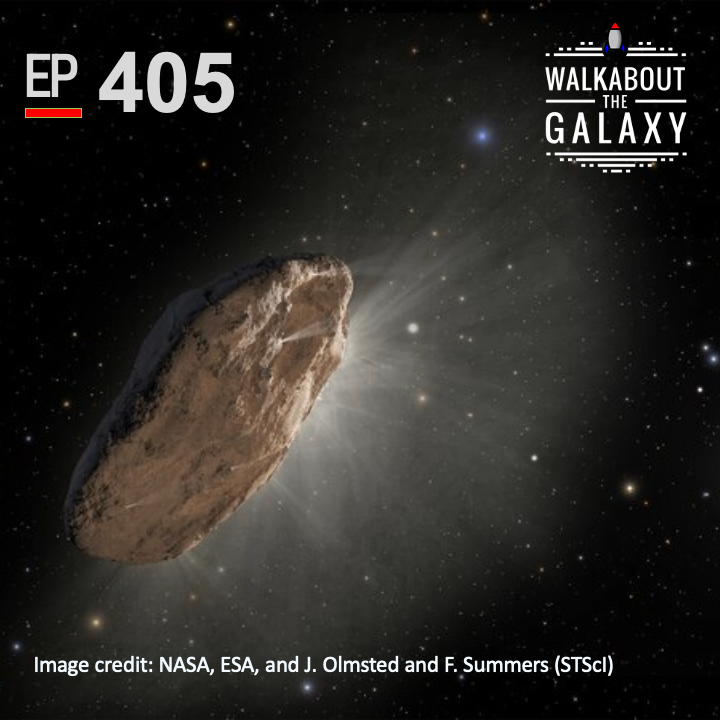
Walkabout the GalaxyExo-Pluto Debris in Our Solar System and Axions GaloreAn interstellar interloper may have been a chip off the old block, where the old block was a Pluto-like planet around another star, and the chip is solid air (nitrogen that is)! And we revisit the potential role of axions in the great dark matter chase and a new way that JWST may help us answer it. Join us for all that, exoplanets, science fiction trivia and more.
2025-09-1046 min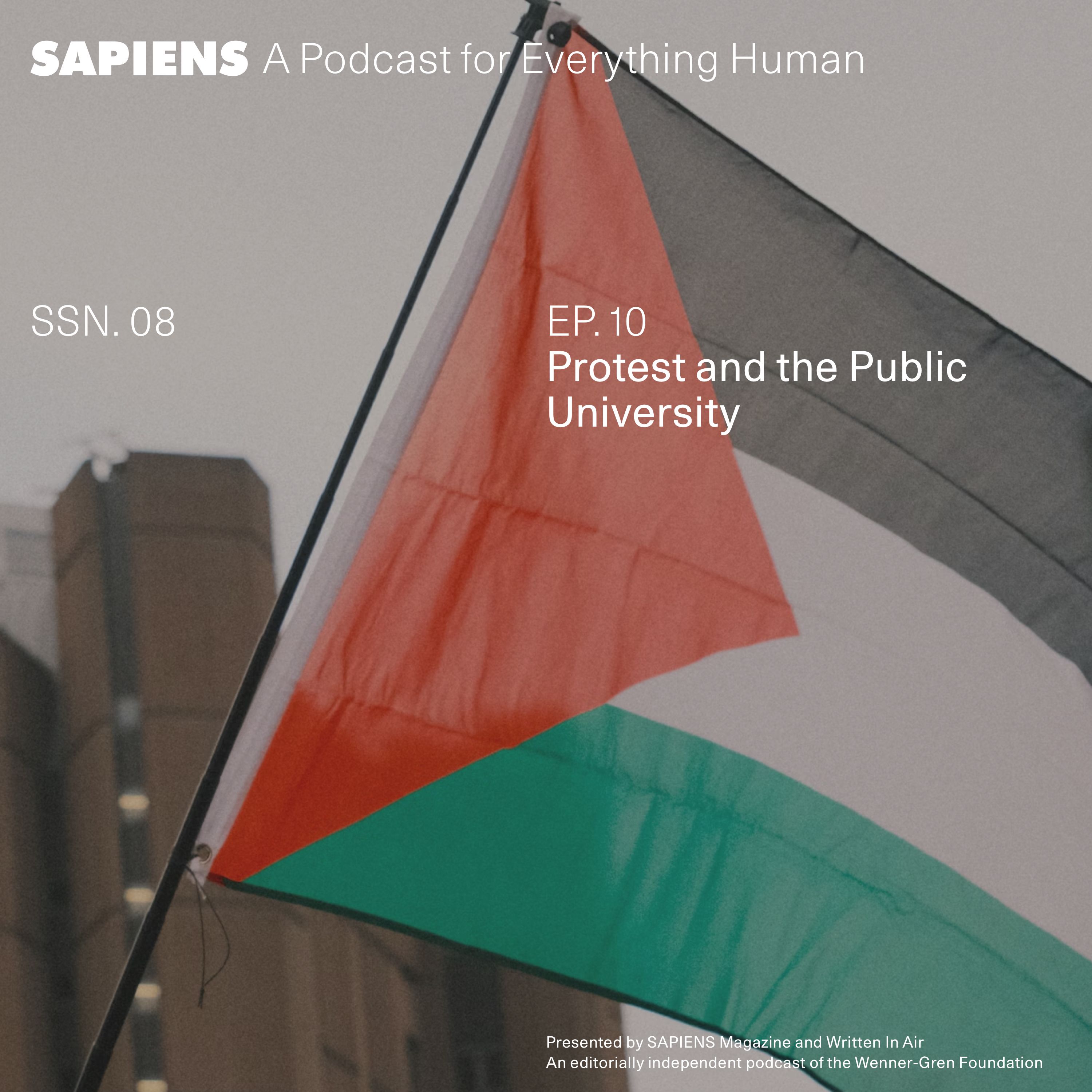
SAPIENS: A Podcast for Everything HumanProtest and the Public UniversityMembers of an encampment at a public university in New York City are on trial for felony charges. In 2024, students across the world launched encampments to challenge university financial ties to Israel in response to the genocide against Palestinians in Gaza. The City University of New York (CUNY), the largest urban public university system in the United States, celebrates and valorizes its long and storied history of activism. However, the administration reacted differently during the 2024 police raid on the Gaza Solidarity Encampment at its flagship campus in Harlem. Comparing the CUNY student movements of the mid-1990s and 2024, this...
2025-06-0330 min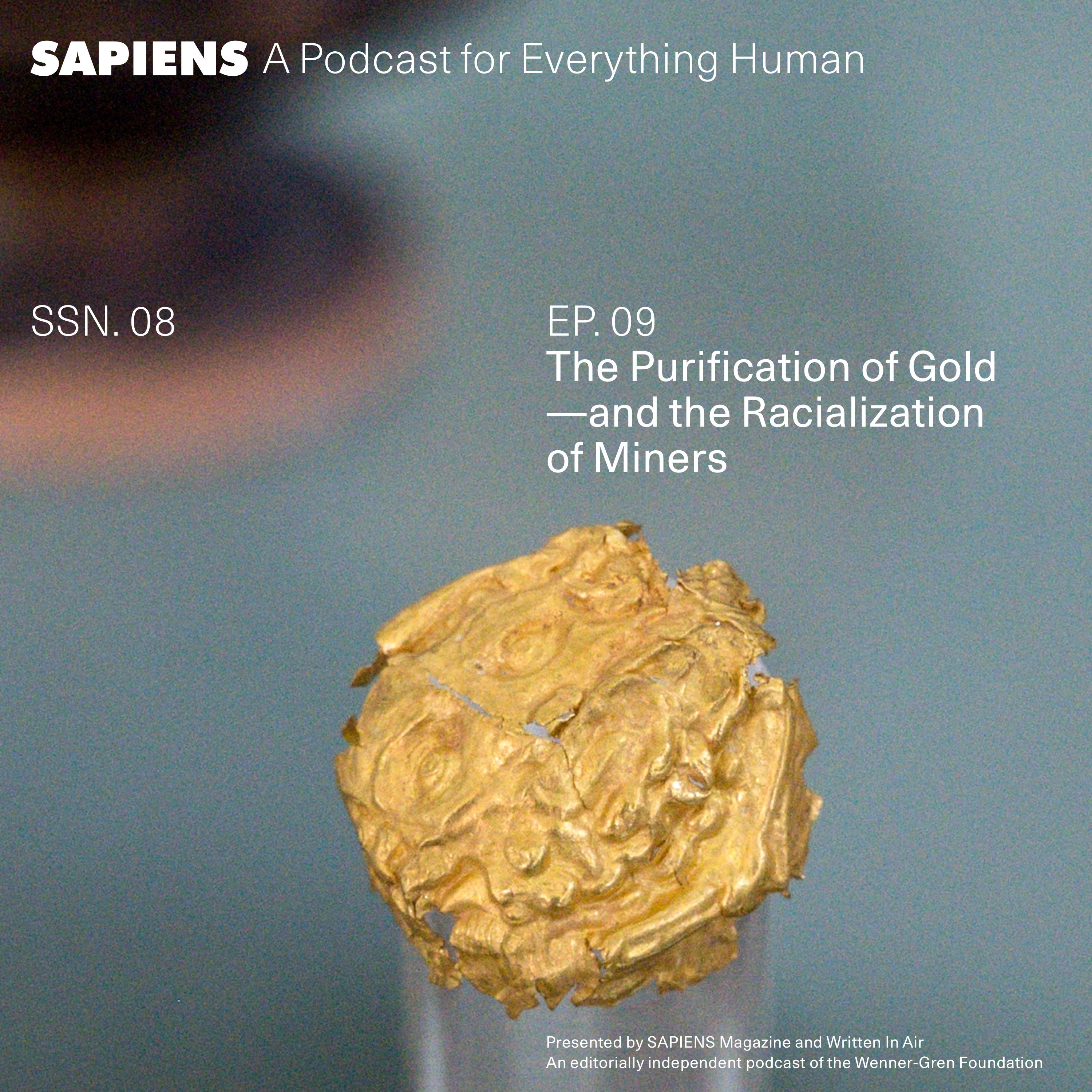
SAPIENS: A Podcast for Everything HumanThe Purification of Gold—and the Racialization of MinersThe gold industry, alongside nation-states, has marginalized the artisanal and small-scale mining (ASM) sector for decades, but now things seem to be changing. The industry has realized that engaging with the ASM sector could be more beneficial for their reputation than excluding it. While once ASM was viewed as a risk, now it is seen as an opportunity.Anthropologist Giselle Figueroa de la Ossa spent more than 20 months studying the gold value chain and the actors involved in it. In this episode, she explores this recent shift around ASM and its unintended consequences.Giselle Figueroa...
2025-05-2734 min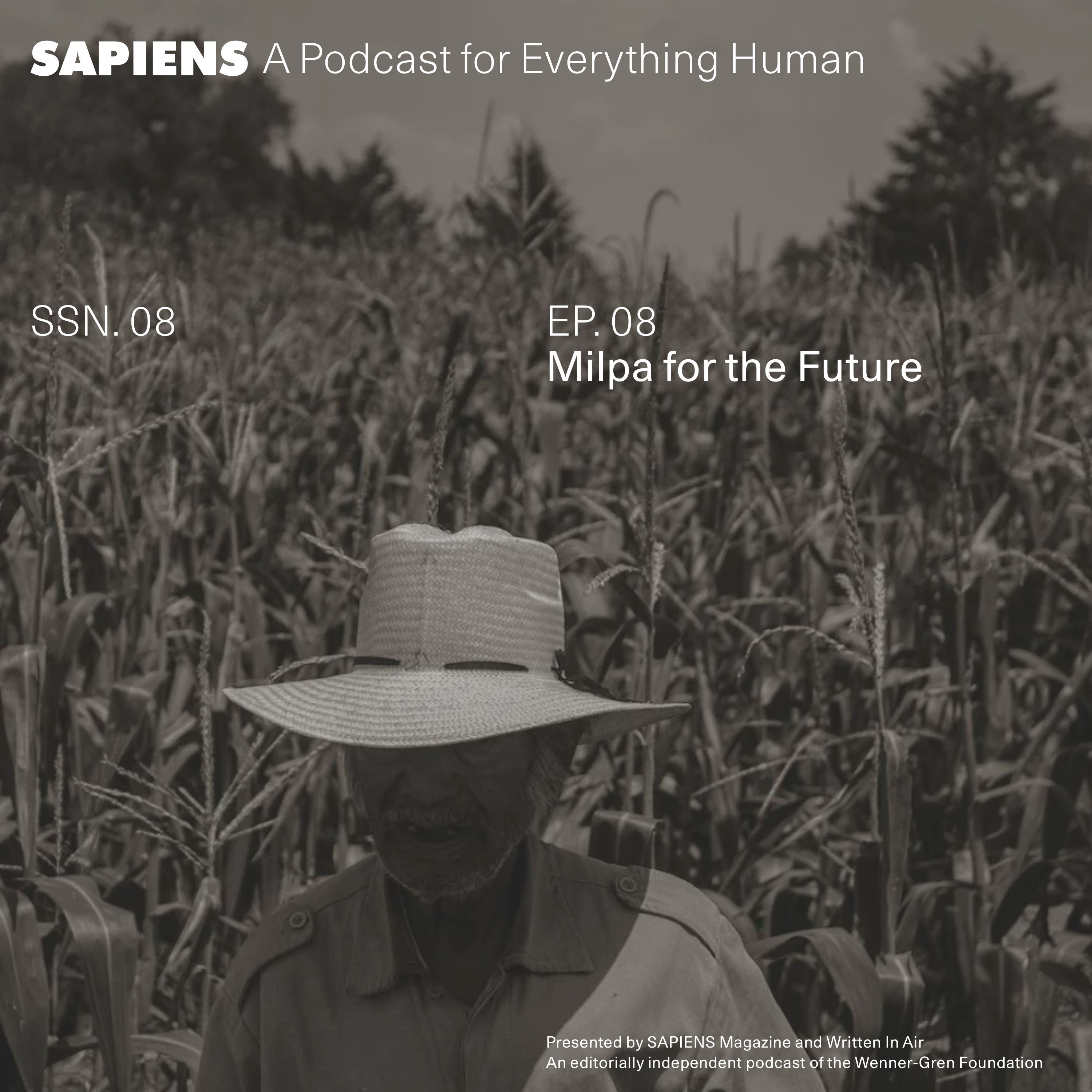
SAPIENS: A Podcast for Everything HumanMilpa for the FutureMilpa is an ancestral way of farming in Mexico and other regions of Mesoamerica that involves growing an assortment of different crops in a single area without synthetic pesticides and fertilizers. This provides people in the region with a wide variety of foods and a balance of nutrients. In recent years, with the introduction of farming based on synthetic herbicides, milpa has changed, and land is used to grow just a single crop. This change in agriculture has led to the rise of ultra-processed foods in these rural areas, which is impacting the nutritional health of the people. This...
2025-05-2025 min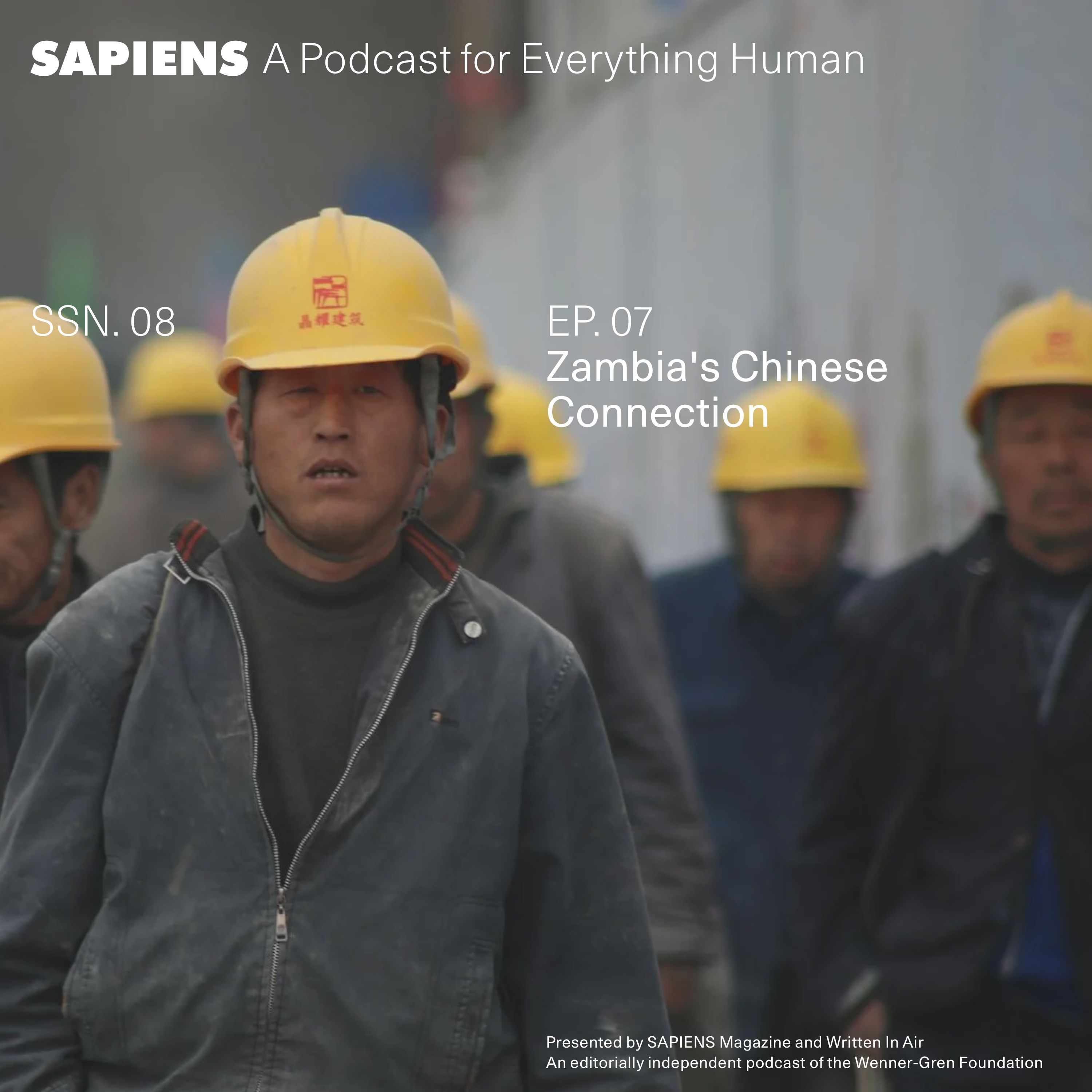
SAPIENS: A Podcast for Everything HumanZambia’s Chinese ConnectionIn the last two decades, an unprecedented wave of Chinese investment and migration to Africa has transformed many economies on the continent. But this has also provoked a storm of controversy, as some criticize the situation as exploitative neocolonialism. Others defend this migration as development assistance and an act of solidarity between regions jointly victimized by European colonialism. In this episode, anthropologist Justin Lee Haruyama takes us to Zambia, where Chinese investment is bringing two cultures together in the country's mines. Justin speaks with local Zambians and researchers on Chinese migration to examine the complicated impacts Chinese a...
2025-05-1329 min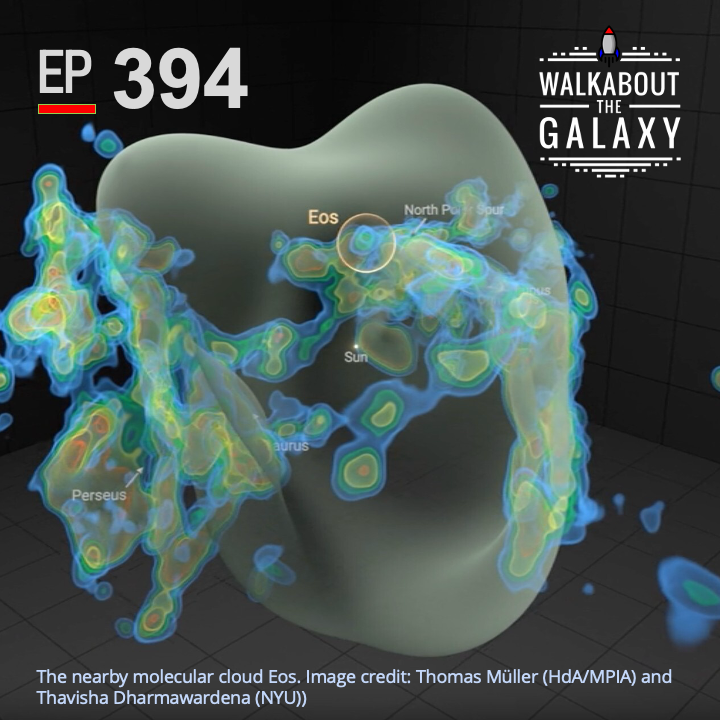
Walkabout the GalaxyVesta Chip Off the Old Block and a Nearby Dark Molecular CloudThe asteroid Vesta may be a fragment of a much larger protoplanet, and astronomers examine old data to discover a large molecular cloud lurking right in the solar system's backyard. Get all the details, plus habitable exoplanets get another look, space news, and trivial matters with your friendly neighborhood astroquarks.
2025-05-0749 min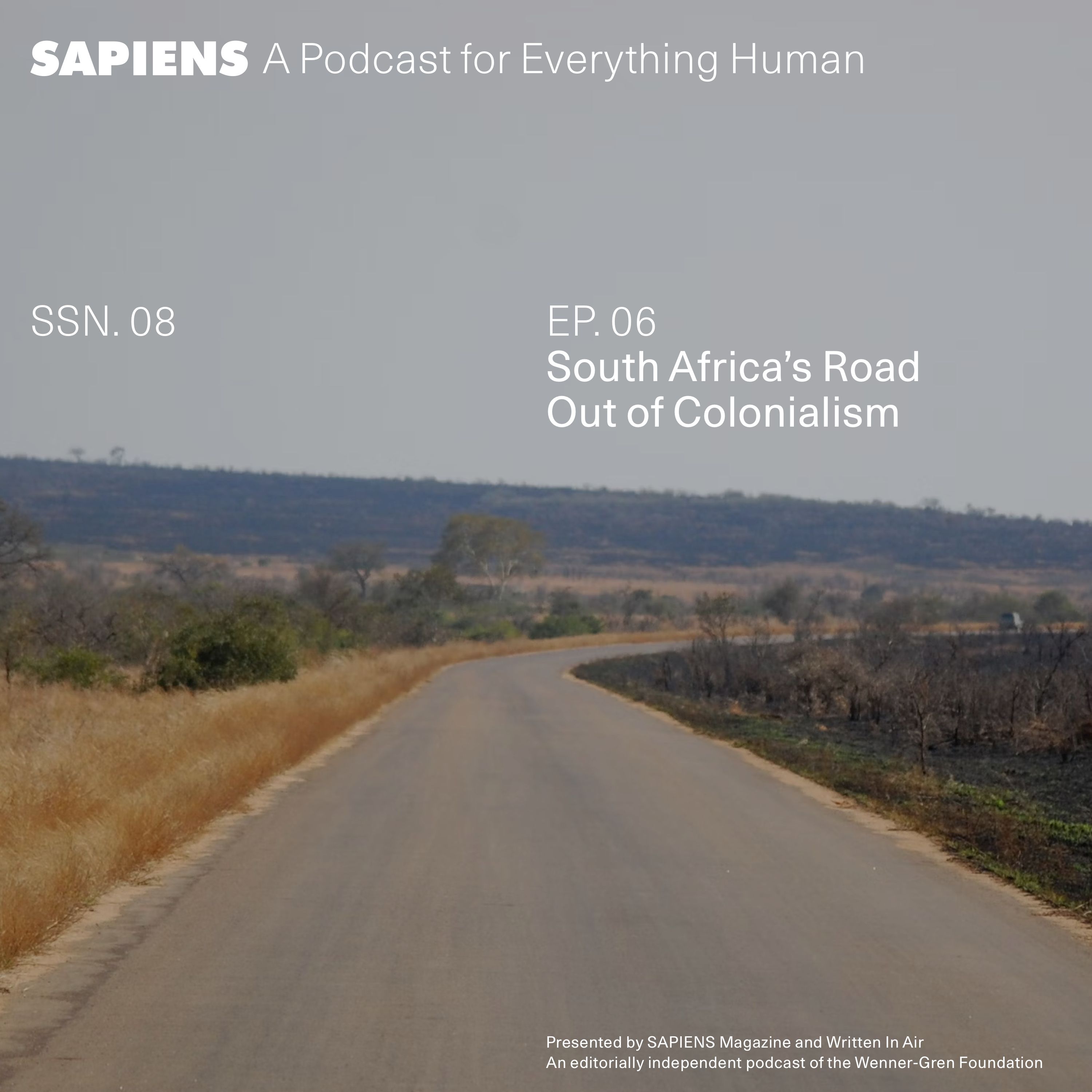
SAPIENS: A Podcast for Everything HumanSouth Africa’s Road Out of ColonialismWhile researching the history of parole in South Africa, a lawyer and anthropologist discovers the origins of the N2 road, which she drives everyday. Now interested in this highway’s history, she explores how this and other roads were used to expand territory and exploit people during South Africa’s colonial periods under Dutch and British rule, and how they kept people separate during the country’s apartheid government from 1948 to 1994. In the present, she learns of a new highway project that threatens to repeat this legacy of racist displacement.Nicole van Zyl is a South African lawyer...
2025-05-0629 min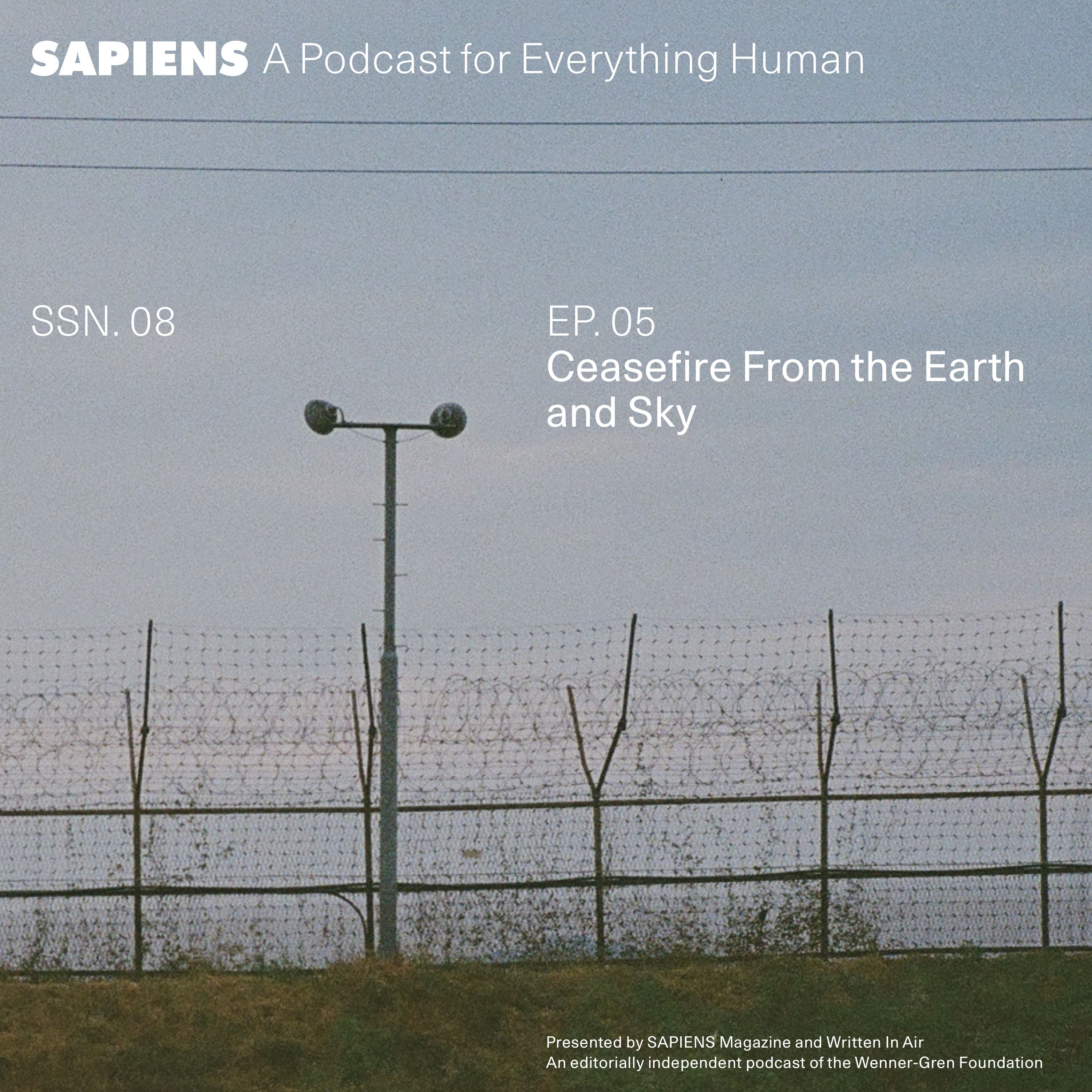
SAPIENS: A Podcast for Everything HumanCeasefire From the Earth and SkyIn existence for more than 70 years, the Korean Demilitarized Zone (DMZ) is the site of the longest ceasefire in the world. What can this region teach us about the long, intended—and unintended—consequences of this form of a truce?In this episode, sociocultural anthropologist T. Yejoo Kim uncovers how residents have been surviving through decades of sonic violence and propaganda, and explores recent developments in such long-lasting psychological warfare. She also details how a former excavationist remembers discovering human remains at the DMZ. Even after more than 70 years, the ceasefire allows war to reverberate through the skies...
2025-04-2933 min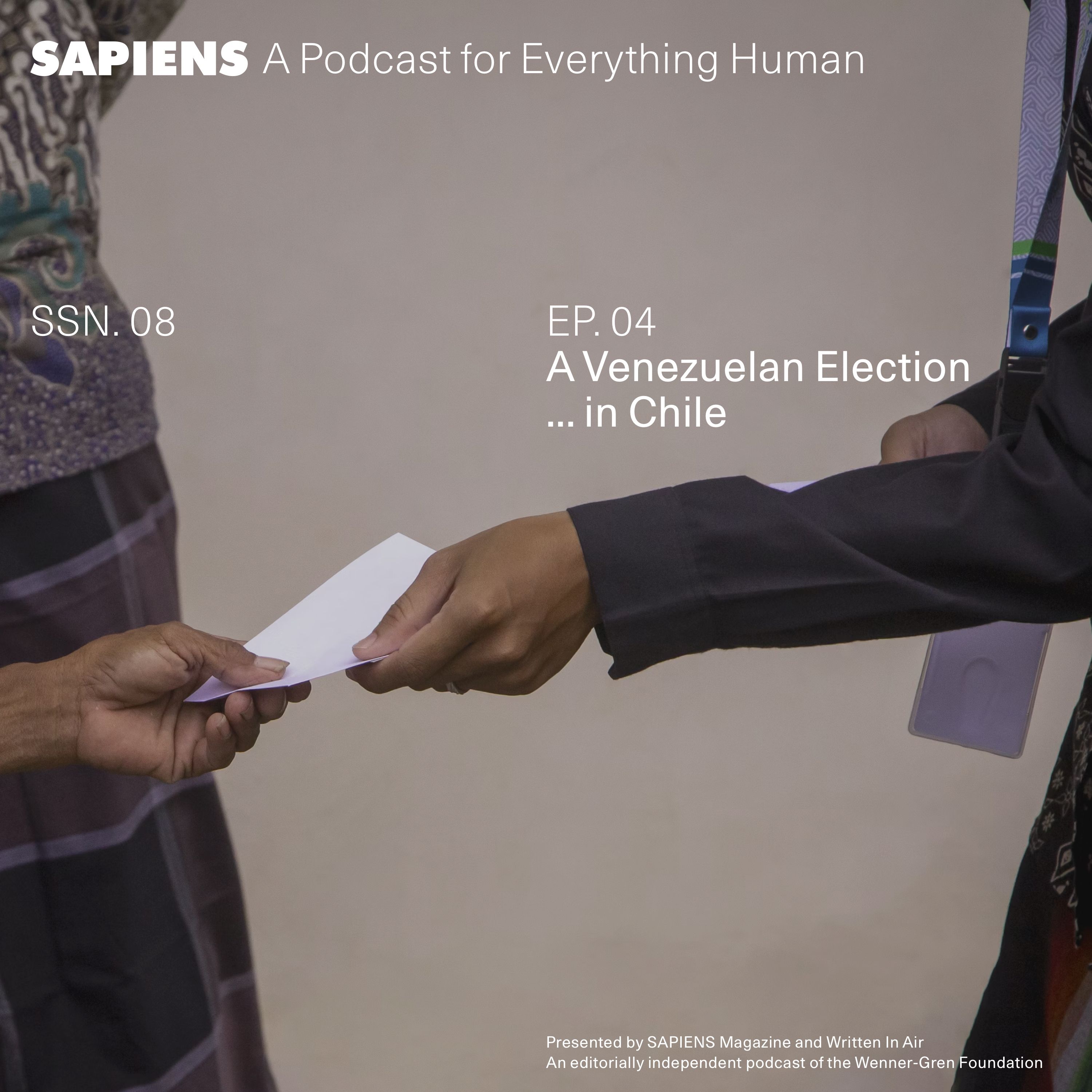
SAPIENS: A Podcast for Everything HumanA Venezuelan Election … in ChileIn this episode, social anthropologist Luis Alfredo Briceño González talks about his experiences as a foreign researcher in Chile. During his fieldwork, he met Marta, a Venezuelan woman residing in an informal settlement on the outskirts of Santiago. Marta and her family held a mock election to protest not being able to vote in their home country during the presidential elections in 2024. Through her story, Luis discusses the enduring emotional and political ties that migrants often have with their home countries.Luis Alfredo Briceño González is a doctoral candidate at the Potificia Universidad Cató...
2025-04-2232 min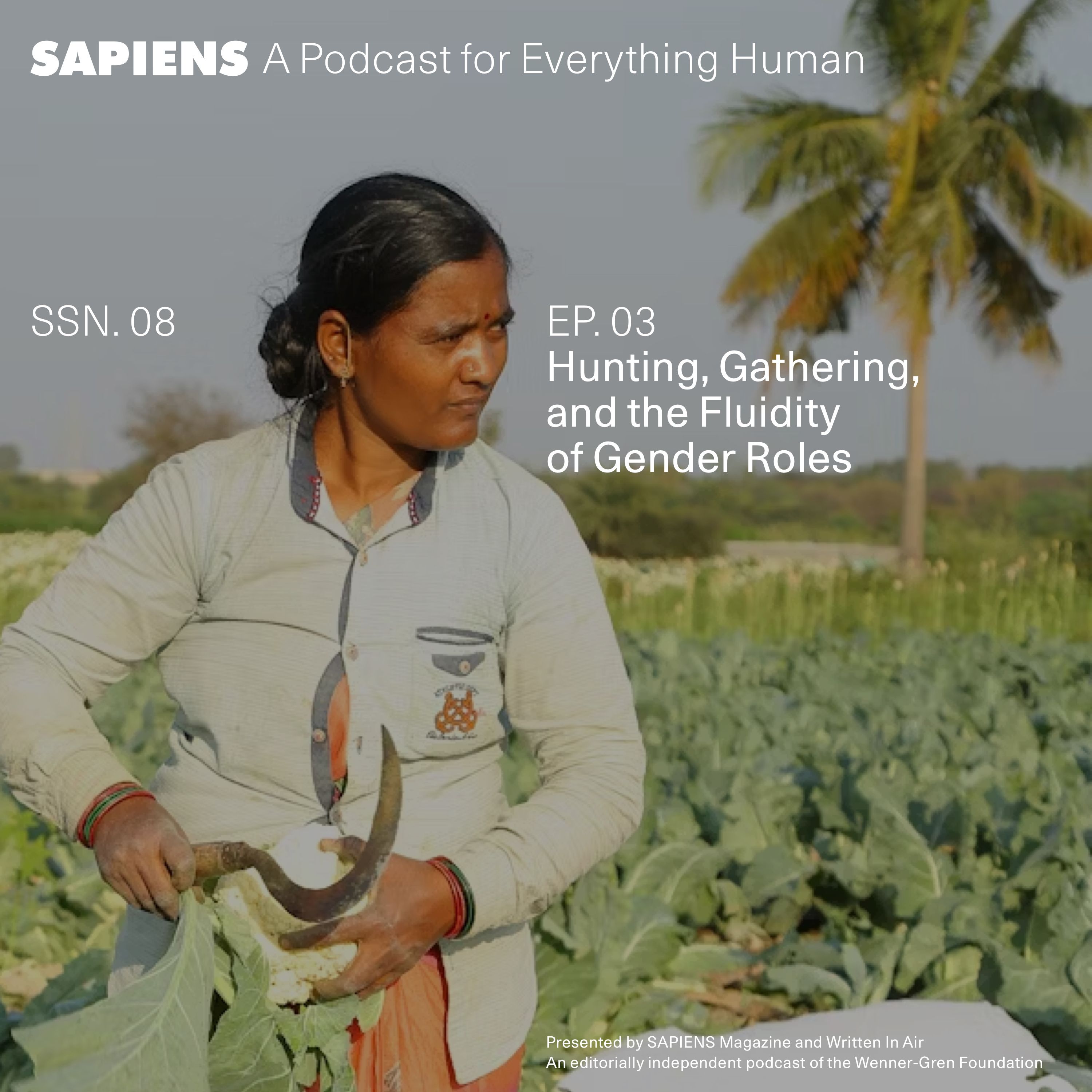
SAPIENS: A Podcast for Everything HumanHunting, Gathering, and the Fluidity of Gender RolesWhen it comes to the division of labor in hunter-gather societies, the stereotype is generally that men hunt and women gather. But when a recent study claimed that women in hunter-gather societies hunt just as much as their male counterparts, the finding made news around the world. But why does gender equality in the past matter so much today?This episode focuses on the complexities of work, gender, and power throughout human evolution. Evolutionary anthropologist Cecilia Padilla-Iglesias guides us through what these can tell us about gender roles in humanity’s past and the origins of uneven po...
2025-04-1538 min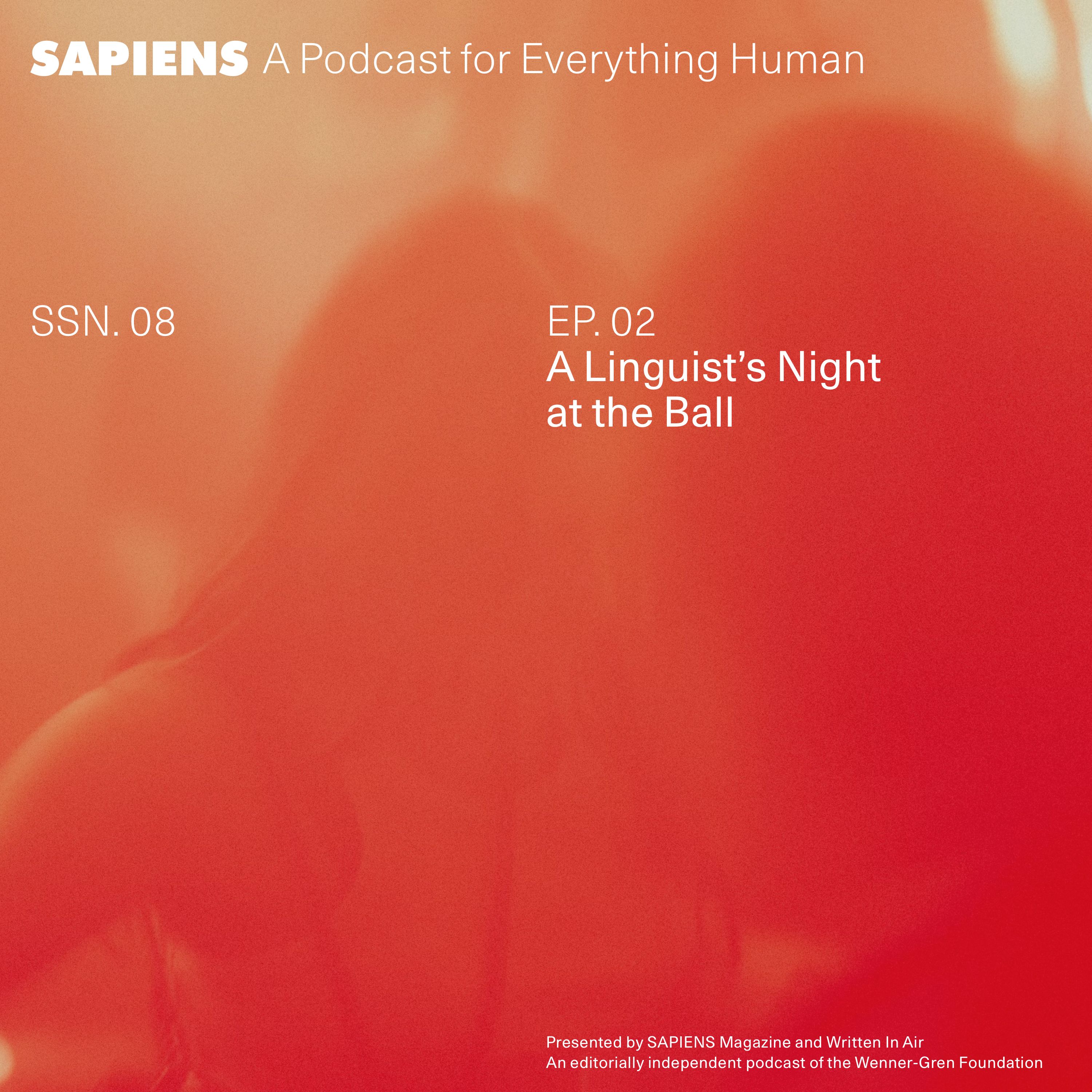
SAPIENS: A Podcast for Everything HumanA Linguist’s Night at the BallSince its emergence in 1960s Harlem, the LGBTQ+ “ballroom scene” has expanded into a transnational subculture. For outsiders, understanding how a ball functions can take time. Join linguistic anthropologist Dozandri Mendoza as they “walk” us through a night at a kiki ball in Puerto Rico. They introduce us to DJs, commentators, performers, and the Boricua Ballroom children who are refashioning the techniques of their trans-cestors. Dozandri guides us through both the expectations of those on the sidelines of the ballroom runway and the anticolonial political meanings behind the Puerto Rican ballroom scene. Dozandri Mendoza is a Ph.D. ca...
2025-04-0838 min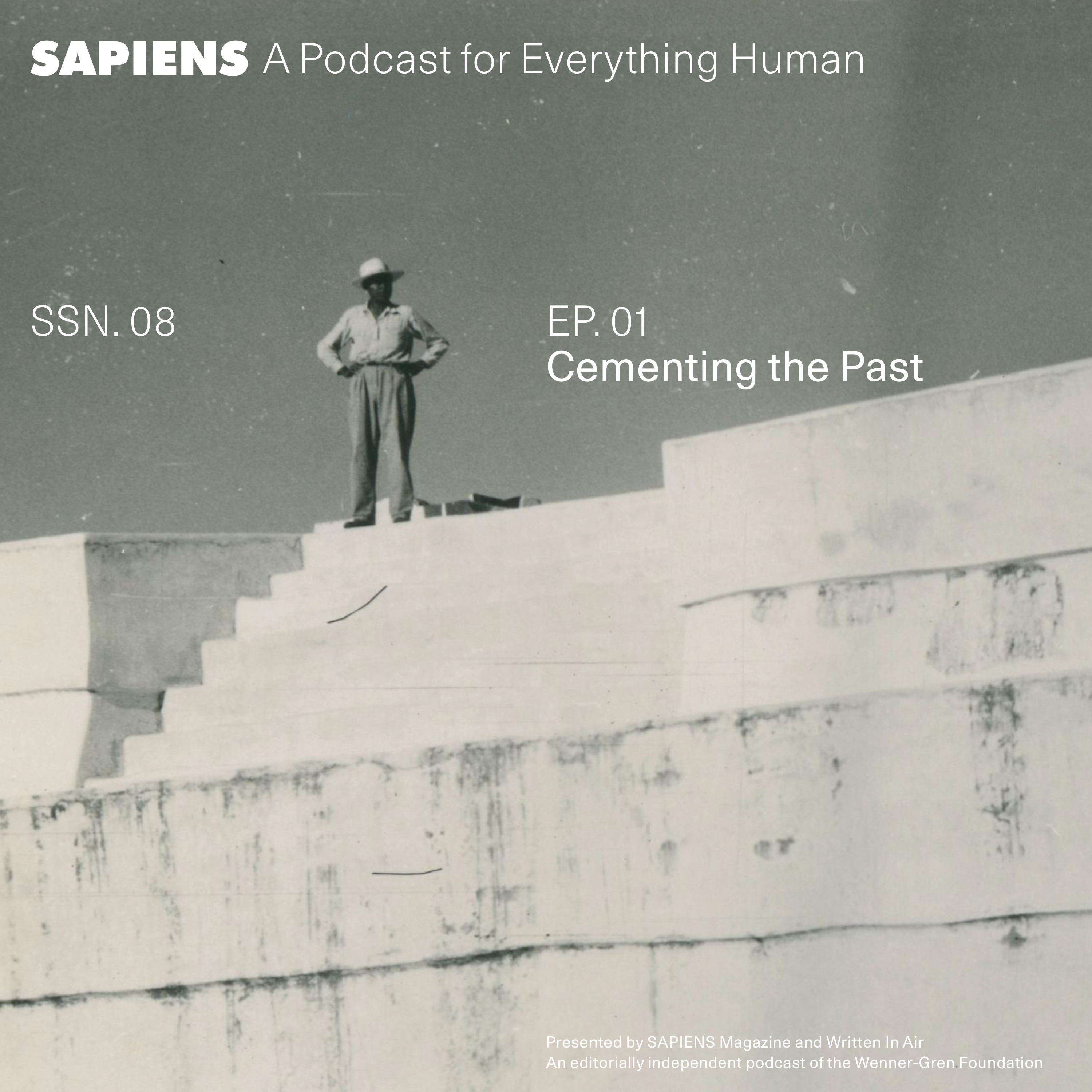
SAPIENS: A Podcast for Everything HumanCementing the PastThe United Fruit Company was a U.S. multinational corporation and at one time, the largest landholder in Central America. To maintain authority in this part of the world, the company stamped out labor reform, collaborated with U.S.-backed coups, and, oddly enough, invested in archaeology. Why?In this episode, anthropologist Charlotte Williams explores the company’s role in preserving the past. She discusses United Fruit's botched conservation project at the Maya site of Zaculeu and the ongoing impacts of that program. Charlotte Williams is a Mellon Democracy and Landscapes Initiative fellow at Dumbarton Oak...
2025-04-0134 min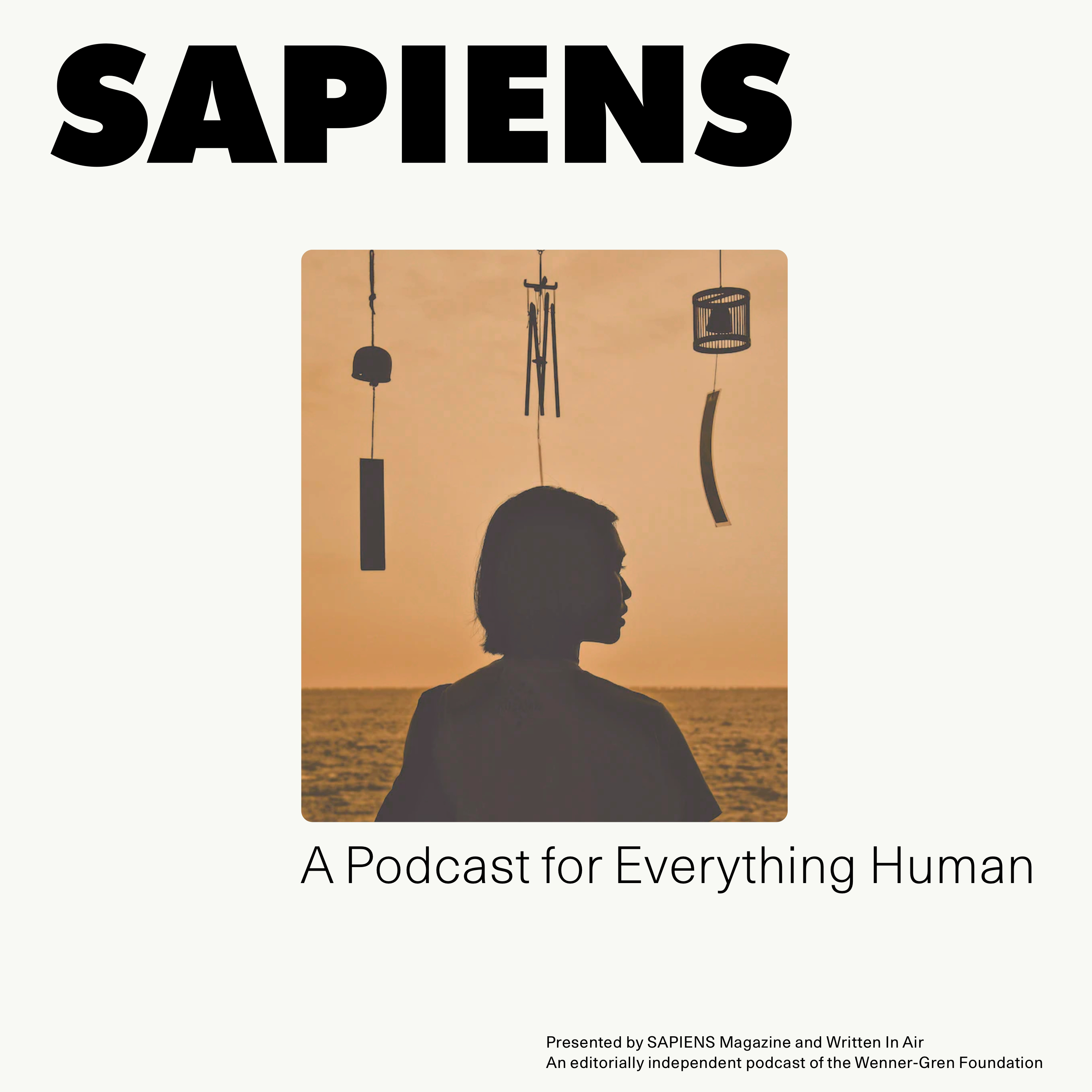
SAPIENS: A Podcast for Everything HumanWhere Cultures Collide: Season 8 TrailerCulture is a force that makes us who we are. It drives social interactions and relationships, shapes beliefs and politics, ignites imaginations, and molds identities. Cultural conflicts are at the heart of many crises facing the world—increasing inequality, persistent bigotry, ecological collapse.In this season of the podcast, we’re investigating these intersections of culture: how past flashpoints echo into today, how present flashpoints are forging our futures. Through the lens of anthropology, we will examine what happens when human cultures meet, merge, and clash—and what these encounters reveal about humanity’s shared fate.Join S...
2025-03-2501 min
Templeton Ideas PodcastChip Colwell (Stuff)Dr. Colwell is an anthropologist, editor, and author of over a dozen books. He received his doctorate from Indiana University and was the Senior Curator of Anthropology at the Denver Museum of Nature & Science for over a decade. He is currently the editor-in-chief of SAPIENS, a digital magazine that makes anthropology accessible to everyone. Chip's latest book is entitled So Much Stuff: How Humans Discovered Tools, Invented Meaning, and Made More of Everything. Chip joins the podcast to explain how we came to live in a society where no matter how much money we spend, it's never enough and...
2024-11-2136 min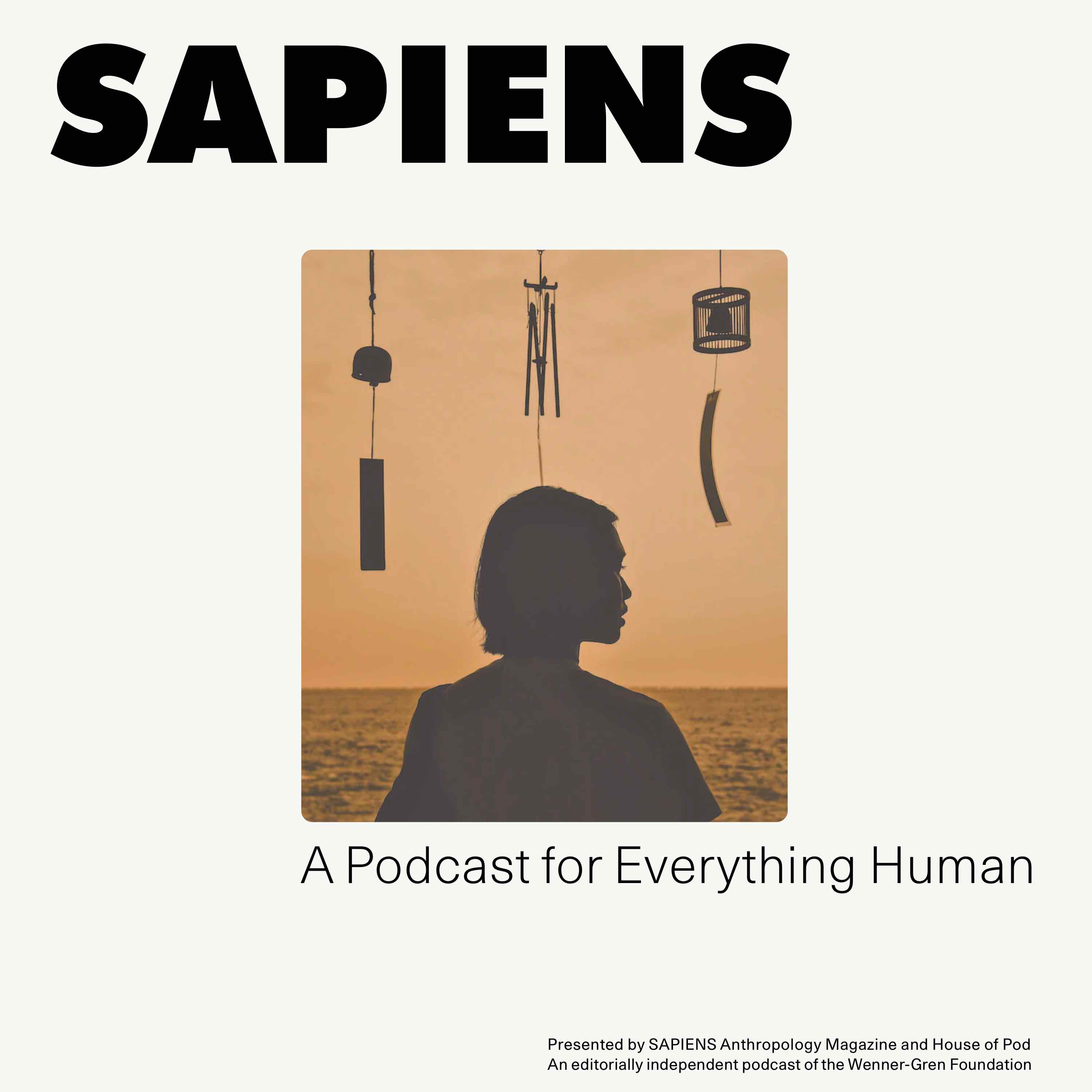
SAPIENS: A Podcast for Everything HumanCultures of Technology: Season 7 TrailerSince the dawn of our species, the ability to make things has made us who we are. Human-made objects, large and small, have enabled and molded evolutionary forces, sparked and expressed our imagination, guided and structured social relations, transformed and destroyed the environment–and much more.
This season of the podcast looks at how a wide range of technologies—from smartphones to comic books to cooking to hydroelectric dams—are intertwined with our lives. Anthropologists’ stories from around the globe reveal fascinating insights into human evolution, social organization, communication, historical trajectories, and the interface between the living and the...
2024-04-2401 min
Something You Should KnowMake Your Dreams Work for You / How Food Affects Mood / Why We Need StuffWe all know that we need to drink a lot of water. But have you ever wondered why? This episode begins with exactly how drinking lots of water helps and how drinking too little hurts. https://www.eatingwell.com/article/17435/why-drink-water-how-water-and-health-are-connected/What determines the content of your dreams? Is it true that people come up with great solutions or ideas in their dreams? What does science tell us about the importance of dreams and is there is a way to actually put them to work for you? Listen as I speak with Deirdre Barrett, a dream researcher...
2024-03-2147 min
Chasing LeviathanHow Our Stuff Makes Us: Tools, Art, Religion, and Evolution with Dr. Chip ColwellIn this episode of Chasing Leviathan, PJ and Dr. Chip Colwell discuss the origin of things, exploring how humans went from having nothing to having everything over the course of four million years. Dr. Colwell emphasizes the interplay between biology and culture, highlighting how our ancestors' use of tools led to physiological changes and the emergence of art and religion. He also explores the meaning of things in our current moment when replaceability of objects has diminished their significance.For a deep dive into Chip Colwell's work, check out his book: So Much Stuff: How Humans Discovered...
2024-03-191h 03
Policing In AmericaThe Huth Method - A conversation with Charles "Chip" HuthChip Huth has spent more than four decades building his leadership credentials. From growing up in poverty, to leading an internationally recognized SWAT unit, to speaking on a TED stage, Chip shares with us his incredible story, lessons he learned the hard way, his mistakes, and his incredible accomplishments. Personally, Chip is someone I look up to and someone who inspires tens of thousands of cops. I hope you enjoy our talk as much as I enjoyed having it. Thank you for your continued support - I am beyond grateful that you continue to join me o...
2024-01-241h 08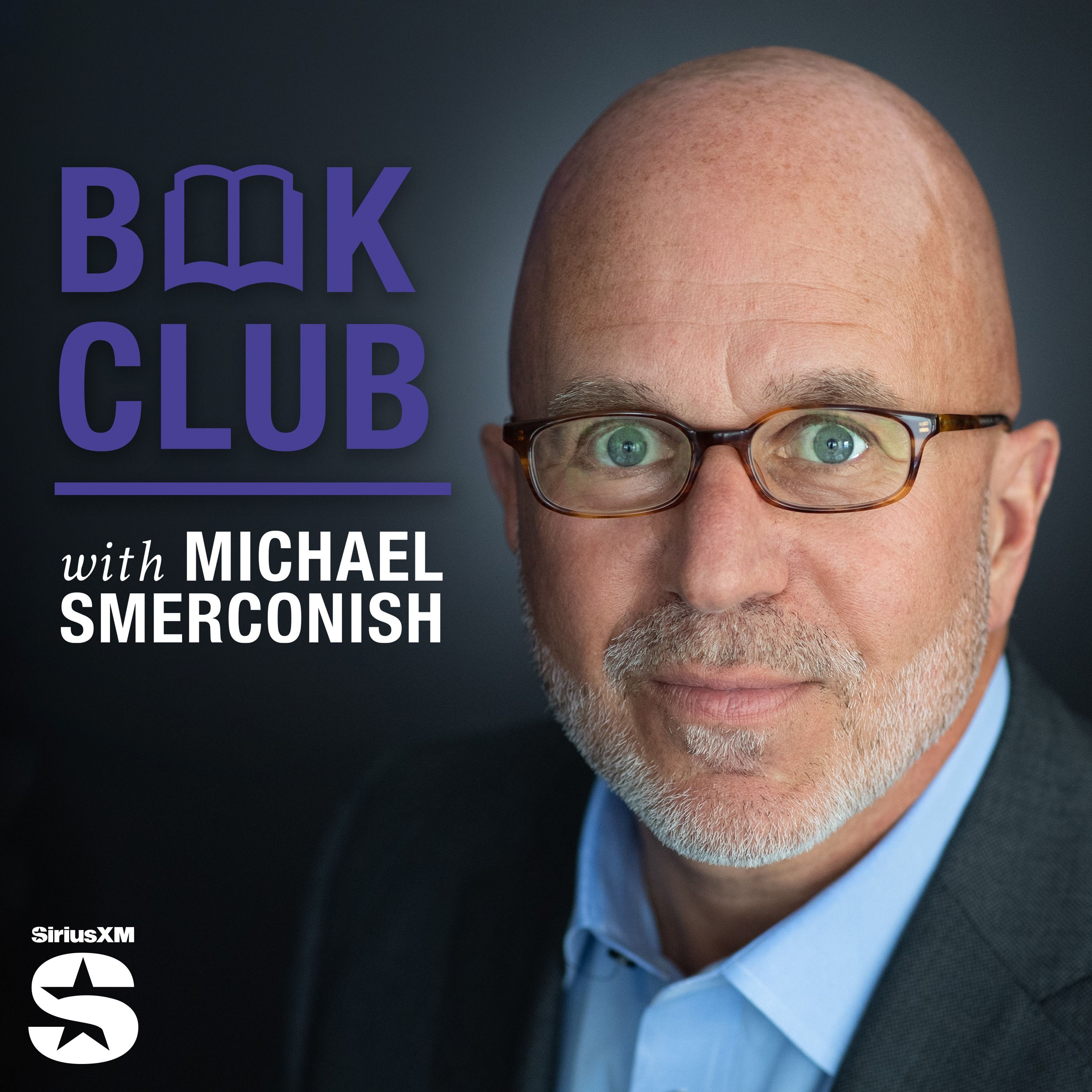
Book Club with Michael SmerconishChip Colwell: "Stuff"Michael is joined by American anthropologist and author Chip Colwell to discuss his new book "Stuff: Humanity's Epic Journey from Naked Ape to Nonstop Shopper." Original air date 11 December 2023. The book was published on 16 November 2023. Hosted by Simplecast, an AdsWizz company. See https://pcm.adswizz.com
for information about our collection and use of personal data for
advertising.
2023-12-1112 min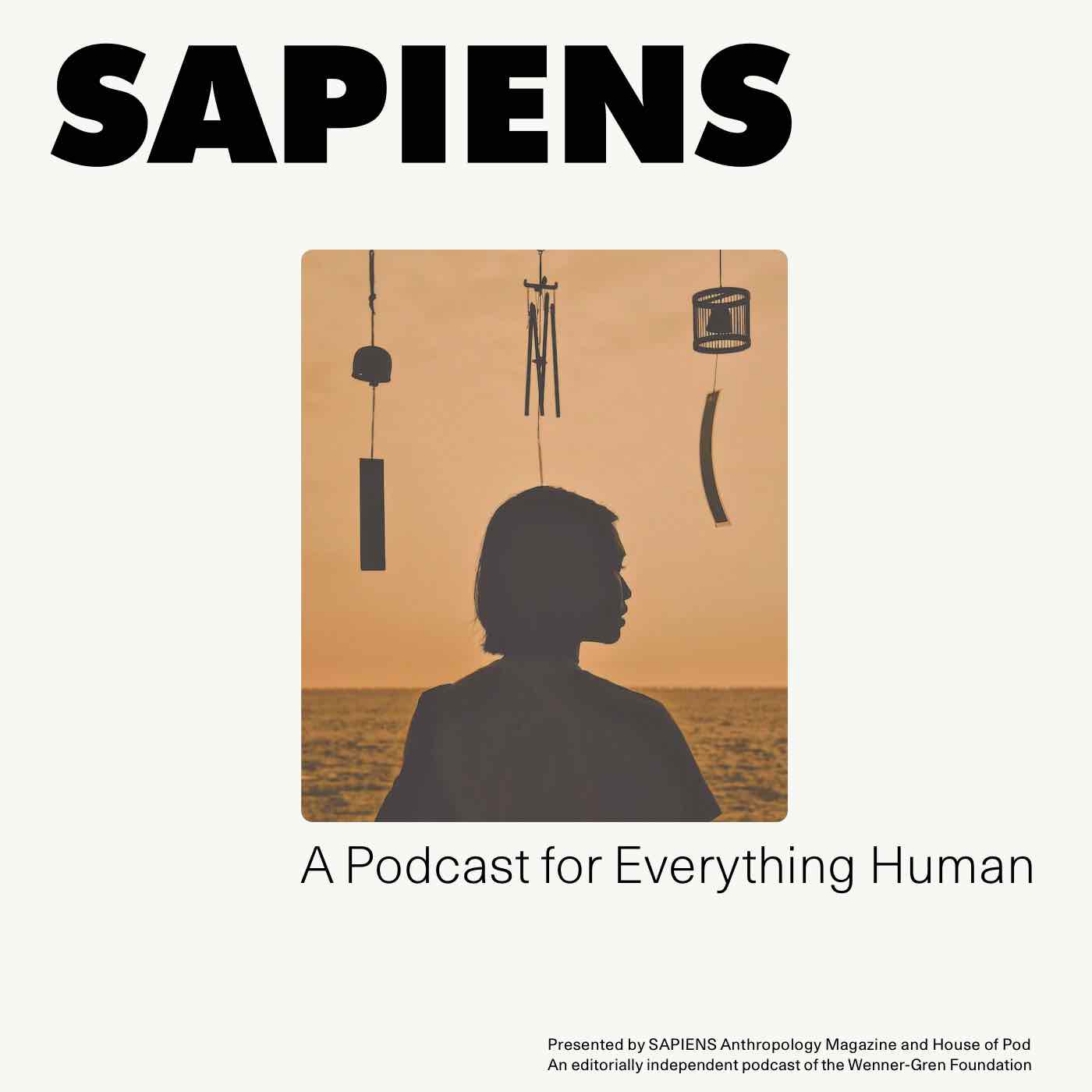
SAPIENS: A Podcast for Everything HumanFinding Mrs. JacksonWhen archaeologists excavate, they have some idea of what they will find in the ground. But in 2016, a team of archaeologists from the University of Massachusetts, Boston, was genuinely surprised when they uncovered a Victorian-era cache. In the process, they forged an uncommonly deep connection with an individual from the past.
Narrated by Anya Gruber, this story shows how archaeology can humanize the past and how loss can bring us closer.
SAPIENS: A Podcast for Everything Human is produced by House of Pod. Cat Jaffee was the editor for this piece, with help from producer An...
2023-05-0927 min
SAPIENS: A Podcast for Everything HumanAneho’s Disappearing CoastAneho is a little historic West African town that is disappearing due to coastal erosion. But locals defy the sea and continue to live on the water’s edge. In this episode, we hear how their decision to stay in the face of an ever-approaching shoreline affects life along the coast and beyond.
As reported by Koffi Nomedji, a doctoral candidate in cultural anthropology from Lomé, Togo, we learn how as humans we variously face climate change–induced disaster.
SAPIENS: A Podcast for Everything Human is produced by House of Pod. Cat Jaffee was the editor...
2023-05-0229 min
SAPIENS: A Podcast for Everything HumanThe Conversion of Julio TiwiramJulio Tiwiram is a famous shaman in southeast Amazonian Ecuador. He is also a leading political figure among the Shuar people of Bomboiza. Growing up at the crossroads of social change and colonial conflict, his path to shamanism was anything but straightforward.
As reported by Sebastián Vacas-Oleas, a social anthropologist working with the Shuar people of Bomboiza, we learn how a mysterious shamanic gathering helped Shuar people mobilize their traditional knowledge to fight for their land against settler occupation.
SAPIENS: A Podcast for Everything Human is produced by House of Pod. Cat Jaffee was the...
2023-04-2524 min
SAPIENS: A Podcast for Everything HumanPeople of the PeppersThe world over people live with plants. Whether it’s in apartment bedrooms or backyards, it’s hard to find a human who doesn’t have some relationship with a plant. Enter paleoethnobotany, a field of archeology that examines plant remains to understand the historic alliance between humans and their vegetation. In this episode, host Eshe Lewis interviews archaeologist Katie Chiou to explore the spiciest human-plant affair: chili peppers.
Katherine L. Chiou is an anthropological archaeologist and paleoethnobotanist whose research interests include foodways in the past and present, Andean archaeology, household archaeology, plant domestication, food sovereignty, agrobiodiversity, sustai...
2023-04-1833 min
SAPIENS: A Podcast for Everything HumanThe Power of Criminal ProsecutorsAnyone who is in prison has been charged for a crime by a prosecutor. The charges are important because they determine someone’s punishment. How do prosecutors make their charging decisions? And what are the long-term impacts of those decisions?
Reported by Esteban Salmón, an anthropologist born and raised in Mexico City, we learn just how powerful a charging decision can be in the Mexican criminal justice system.
SAPIENS: A Podcast for Everything Human is produced by House of Pod. Cat Jaffee was the editor for this piece, with help from producer Ann Marie Awad...
2023-04-1126 min
SAPIENS: A Podcast for Everything HumanI Do This for You, MomJeri Hutton Green is a mother, daughter, and advocate for survivors of domestic violence and homicide in Baltimore, Maryland. Her journey as an advocate began when her mother went missing in April 2020. A text message launched a 2-year battle for justice for her mother and other missing Black women.
Reported by Brendane A. Tynes, a doctoral candidate in anthropology and an interpersonal violence survivor advocate, this episode explores what it means to survive domestic violence and police violence as a Black woman.
SAPIENS: A Podcast for Everything Human is produced by House of Pod. Cat Ja...
2023-04-0432 min
SAPIENS: A Podcast for Everything HumanA Story of Icelandic Skulls“Prime harvest”—that’s how one early 20th-century explorer described his collection of Icelandic human skulls. But why did he “harvest” those skulls in the first place? And what should happen to them now more than a century after they were collected? This case of the Icelandic skulls reveals an interconnected story of eugenics, international law, and the limits of current repatriation efforts.
As reported by Adam Netzer Zimmer, an Iceland-based anthropologist, we hear how a community once targeted by anthropologists is now expanding our ideas of how to ethically handle human remains.
SAPIENS: A Podcast for E...
2023-03-2836 min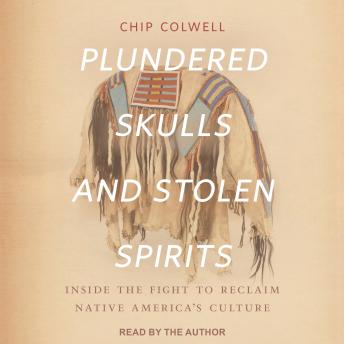
Feel The Riveting Full Audiobook Now, Story Seekers!Plundered Skulls and Stolen Spirits: Inside the Fight to Reclaim Native America’s Culture by Chip ColwellPlease visithttps://thebookvoice.com/podcasts/1/audiobook/600214to listen full audiobooks.
Title: Plundered Skulls and Stolen Spirits: Inside the Fight to Reclaim Native America’s Culture
Author: Chip Colwell
Narrator: Chip Colwell
Format: Unabridged Audiobook
Length: 9 hours 27 minutes
Release date: August 30, 2022
Ratings: Ratings of Book: 5 of Total 3
Ratings of Narrator: 5 of Total 2
Genres: Social Science
Publisher's Summary:
Who owns the past and the objects that physically connect us to history? And who has the right to decide this ownership, particularly when the objects are sacred or, in the case of skeletal remains, human? Is it the museums that care for the ob...
2022-08-309h 27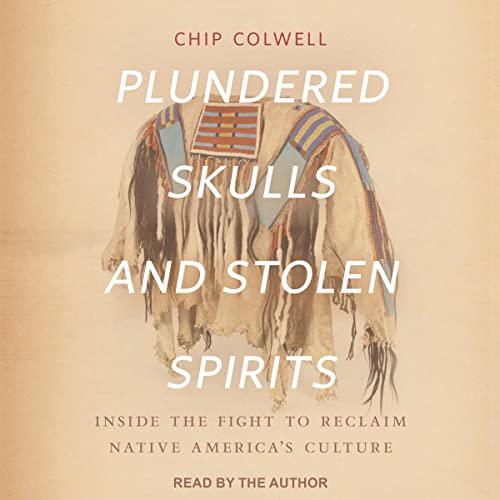
Don’t Miss Your Ears To A Immersive Full Audiobook.Plundered Skulls and Stolen Spirits by Chip ColwellPlease visithttps://thebookvoice.com/podcasts/2/audible/167096to listen full audiobooks.
Title: Plundered Skulls and Stolen Spirits
Author: Chip Colwell
Narrator: Chip Colwell
Format: mp3
Length: 9 hrs and 27 mins
Release date: 08-30-22
Ratings: 5 out of 5 stars, 5 ratings
Genres: Library & Museum Studies
Publisher's Summary:
Today, hundreds of tribes use the Native American Graves Protection and Repatriation Act to help them recover their looted heritage from museums across the country. As senior curator of anthropology, Chip Colwell navigated firsthand the questions of how to weigh the religious freedom of Native Americans against the academic freedom of scientists and whether the emptying of...
2022-08-309h 27
Listen to Latest Full Audiobooks in Non-Fiction, Social SciencePlundered Skulls and Stolen Spirits: Inside the Fight to Reclaim Native America’s Culture by Chip ColwellPlease visithttps://thebookvoice.com/podcasts/1/audiobook/600214to listen full audiobooks.
Title: Plundered Skulls and Stolen Spirits: Inside the Fight to Reclaim Native America’s Culture
Author: Chip Colwell
Narrator: Chip Colwell
Format: Unabridged Audiobook
Length: 9 hours 27 minutes
Release date: August 30, 2022
Ratings: Ratings of Book: 5 of Total 3
Ratings of Narrator: 5 of Total 2
Genres: Social Science
Publisher's Summary:
Who owns the past and the objects that physically connect us to history? And who has the right to decide this ownership, particularly when the objects are sacred or, in the case of skeletal remains, human? Is it the museums that care for the ob...
2022-08-309h 27
ITPS PodcastSeason 2 Episode 2: Chip ColwellThis month, I interview Chip Colwell. We talk about his wide-ranging work as an anthropologist, museologist, and a public-facing scholar. We talk about why it is so important and beneficial for public historians and scholars to reach out to their respective public, and then about his work at the Denver Museum of Nature & Science. There, he formed relationships with indigenous communities, directed the museum’s operations concerning repatriation and the Native American Graves Protection and Repatriation Act, his work on the Museum’s Native Science Initiative, and his ongoing work as Editor in Chief of the global public humanities proj...
2022-05-1843 min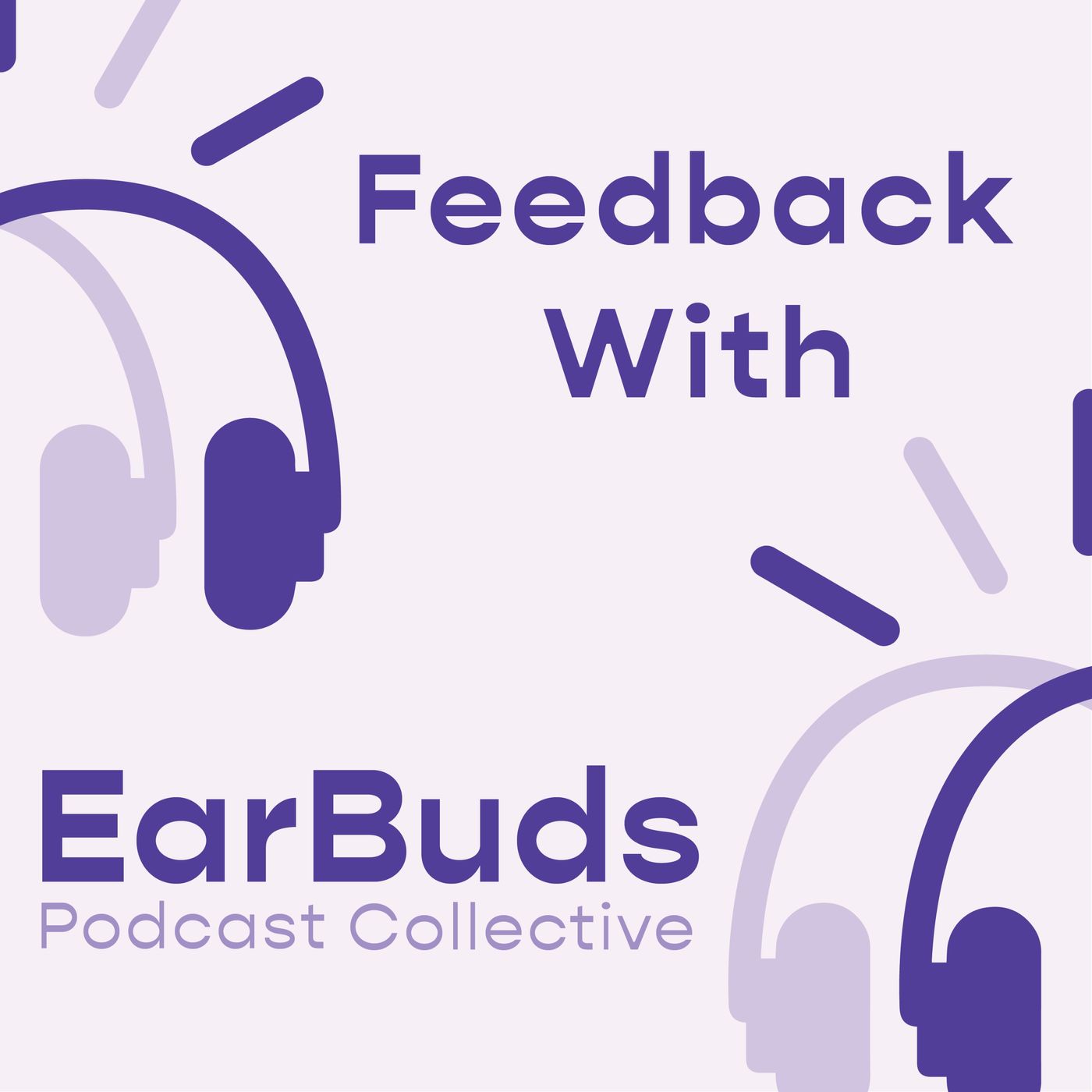
Feedback with EarBuds: The Podcast Recommendation PodcastRewriting Black And Indigenous HistoriesWelcome to Feedback with EarBuds, the podcast recommendation podcast. Our newsletter brings you five podcast recommendations each week according to a theme, and curated by a different person. Our podcast is an audio version of the newsletter. Subscribe to the newsletter: eepurl.com/cIcBuH This week's theme is Rewriting Black and Indigenous Histories. The curator is Chip Colwell, editor-in-chief of the SAPIENS magazine and executive producer of SAPIENS: A Podcast For Everything Human.Why did Chip choose this theme? "In the months following George Floyd’s murder, the magazine and podcast I work on, SA...
2022-05-1711 min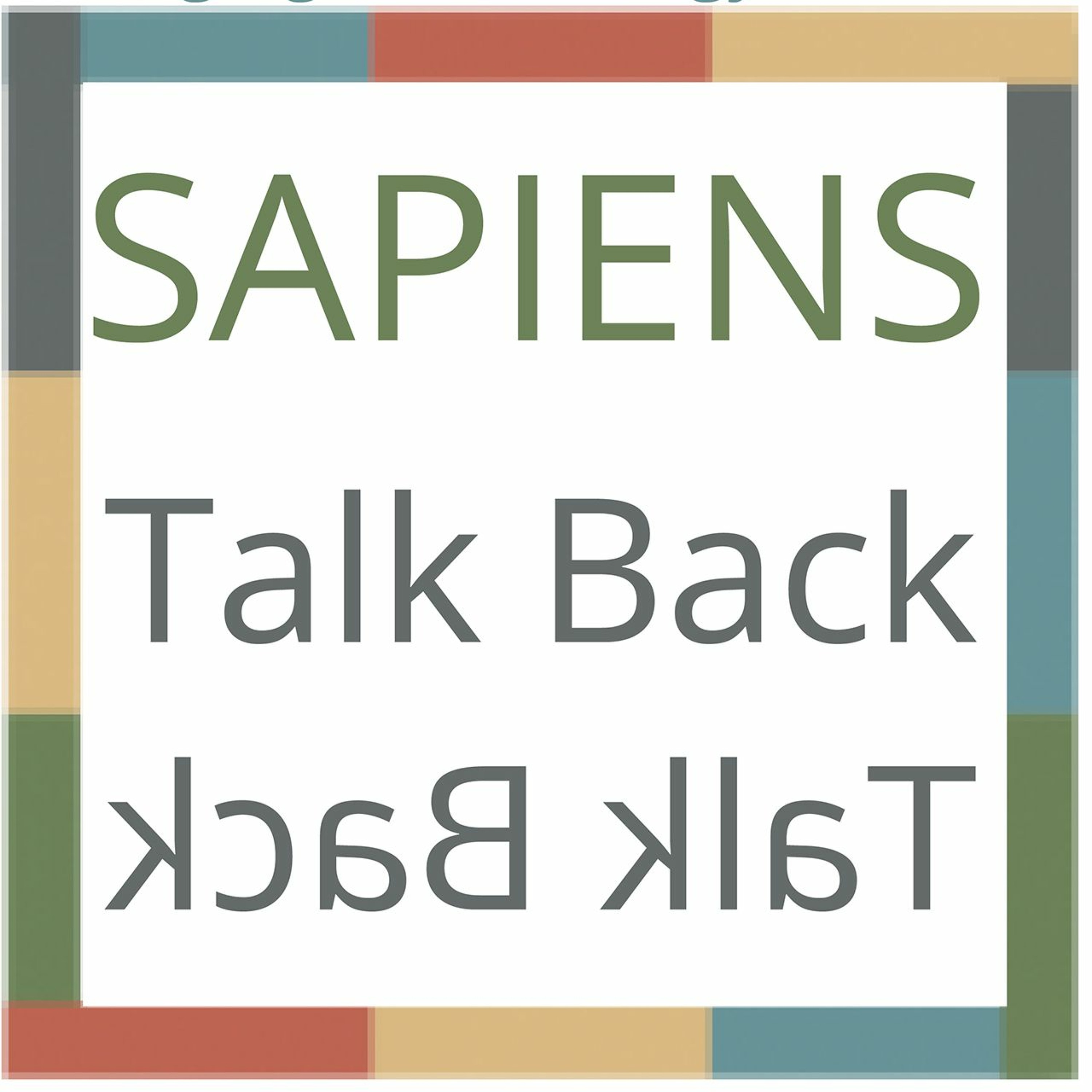
RadioCIAMSSAPIENS Talk Back: Looking Forward Looking BackThe Archaeology Centers Coalition and RadioCIAMS present “SAPIENS Talk Back”: eight conversations with students and scholars that expand upon the insights of Season 4 of the SAPIENS podcast entitled “Our Past is the Future.” In the final episode of our series, we look back on both the SAPIENS series and the conversations we have had here on SAPIENS Talk Back in order to look ahead to the future of archaeology. Our guests this episode represent new professional organizations that are pushing the discipline of archaeology in consequential new directions: Dr. Ayana Omilade Flewellen, Assistant Professor in the Department of Anthropology at the Univ...
2022-04-271h 06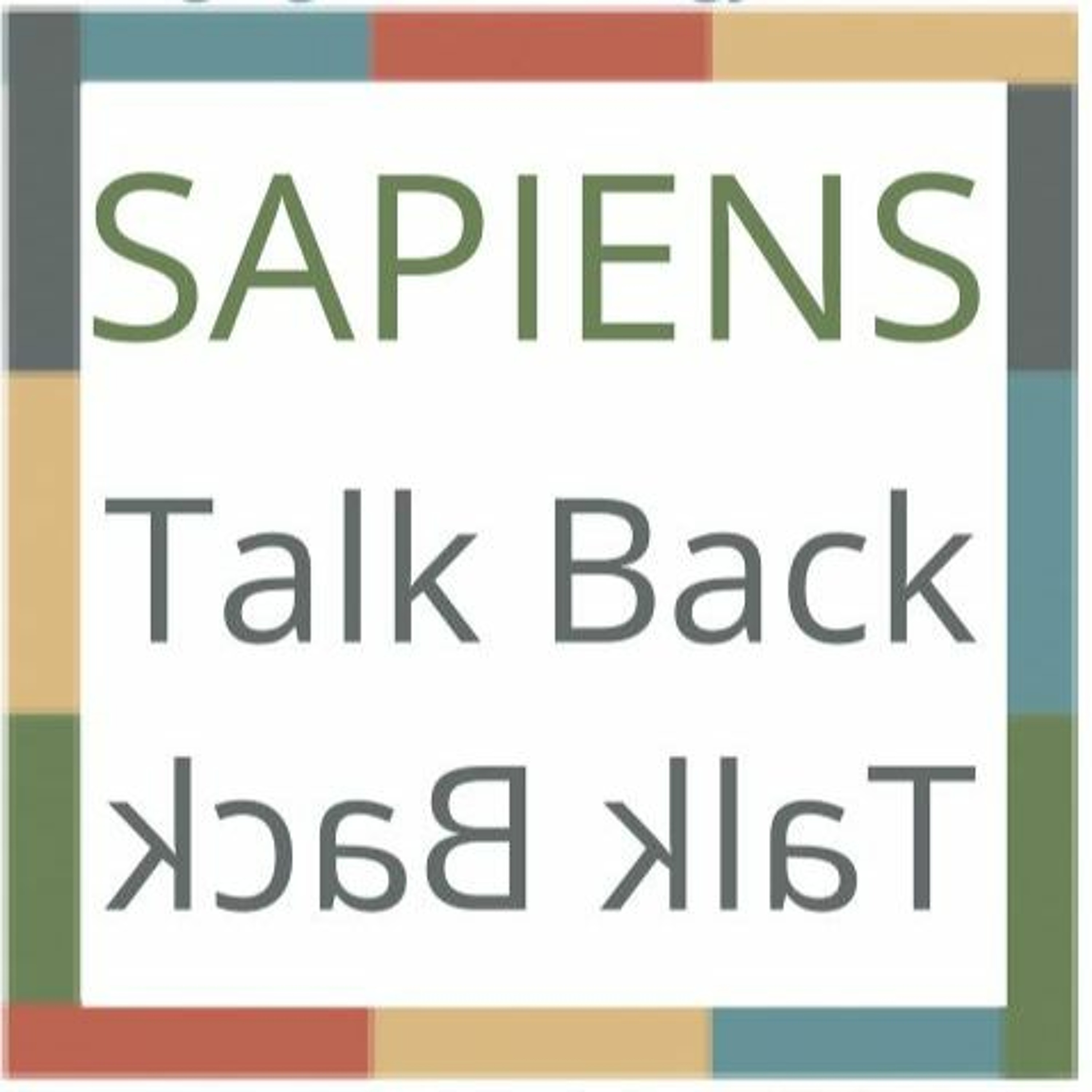
RadioCIAMSSAPIENS Talk Back: Repatriation And ArchaeologyThe Archaeology Centers Coalition and RadioCIAMS present “SAPIENS Talk Back”: eight conversations with students and scholars that expand upon the insights of Season 4 of the SAPIENS podcast entitled “Our Past is the Future.” In this episode, we continue the discussion that began in episode 7 of season 4 of the SAPIENS podcast, a conversation that examines “repatriation” and what it means for archaeology. Our guests this episode are Dr. Rachel Watkins, an associate professor in the Department of Anthropology at American University and a specialist in African American biohistory, and Dr. Dorothy Lippert, an expert in repatriation and a tribal liaison for the Smithson...
2022-04-2046 min
RadioCIAMSSAPIENS Talk Back: Setting The Table: Archaeology And ResistanceThe Archaeology Centers Coalition and RadioCIAMS present “SAPIENS Talk Back”: eight conversations with students and scholars that expand upon the insights of Season 4 of the SAPIENS podcast entitled “Our Past is the Future.” In this episode, we continue the discussion that began in episode 6 of season 4 of the SAPIENS podcast, a conversation that examines “Slavery, Sustenance, and Resistance,” or what we might think of as “Setting the Table for an Archaeology of Resistance.” Our guests for this episode are Dr. Peggy Brunache, Lecturer of the History of Atlantic Slavery at the University of Glasgow and the first director of the Beniba Centre fo...
2022-04-0653 min
RadioCIAMSSAPIENS Talk Back: Studying (& Not Studying) Sacred SitesThe Archaeology Centers Coalition and RadioCIAMS present “SAPIENS Talk Back”: eight conversations with students and scholars that expand upon the insights of Season 4 of the SAPIENS podcast entitled “Our Past is the Future.” In this episode, we continue the discussion that began in episode 5 of season 4 of the SAPIENS podcast, a conversation that examines how archaeologists study sacred sites, and when they don’t. Our guests for this episode are Dr. Ora Marek-Martinez, Assistant Professor of Anthropology at Northern Arizona University and Director of the Office of Native American Initiatives, and co-host of the SAPIENS podcast this season, and Dr. Nicholas L...
2022-03-231h 01
SAPIENS: A Podcast for Everything HumanMore than a MountainThe sky island of Dzil Nchaa Si'an is more than a mountain. It is a significant landmark in Arizona for Apache tribal members to collect medicinal plants, perform ceremonies, and connect with their ancestors. It is also a site of resistance against the development of an observatory informally known as the “Pope Scope,” for its ties to the Vatican.
(00:01:47) A history of competing interests atop Dzil Nchaa Si'an, or Mt.Graham.
(00:04:18) Introduction.
(00:05:06) Nick and the “Pope Scope” conflict.
(00:07:04) About Field schools and Apache Trust Lands.
(00:08:49) How Nick becomes an archaeologist.
(00:11:09) Sacred vs holy on Mt. Graham.
(00:14:30) Fire on Mt...
2022-03-1633 min
RadioCIAMSSAPIENS Talk Back: Decolonizing Heritage And CurationThe Archaeology Centers Coalition and RadioCIAMS present “SAPIENS Talk Back”: eight conversations with students and scholars that expand upon the insights of Season 4 of the SAPIENS podcast entitled “Our Past is the Future.” In this episode, we welcome the featured guests of Episode 4 of SAPIENS Season 4: Dr. Tiffany Fryer, Cotsen Postdoctoral Fellow in the Princeton University Society of Fellows and a lecturer in Princeton’s Department of Anthropology, and Dr. Sven Haakanson, Associate Professor in the Department of Anthropology at the University of Washington, Curator of Native American Anthropology at the Burke Museum, and a former MacArthur Fellow.
“SAPIENS Talk Back” was de...
2022-03-0942 min
SAPIENS: A Podcast for Everything HumanCurating as CaretakingIn this episode, museum curators challenge the status quo and connect their ancestry to advance how history is told in cultural institutions. Mary Elliot brings listeners behind the scenes into the Slavery and Freedom exhibition at the Smithsonian's National Museum of African American History and Culture. And Dr. Sven Haakanson helps re-create an angiaaq, which is like a kayak, at the Burke Museum in Seattle, Washington.
(00:01:24) Meet Mary Elliott, the curator of American slavery at the Smithsonian's National Museum of African-American History and Culture.
(00:06:46) Introduction.
(00:07:20) How Mary Elliott began tracing her own ancestral roots.
(00:11:43) How Dr. S...
2022-03-0235 min
RadioCIAMSSAPIENS Talk Back: Archaeology and Social JusticeThe Archaeology Centers Coalition and RadioCIAMS present “SAPIENS Talk Back”: eight conversations with students and scholars that expand upon the insights of Season 4 of the SAPIENS podcast entitled “Our Past is the Future.” In this episode, we welcome the featured guests of Episode 3 of SAPIENS Season 4: Dr. Kisha Supernant, Associate Professor in the Department of Anthropology at the University of Alberta and Director of the Institute of Prairie and Indigenous Archaeology, and Lenora McQueen, an activist who has worked tirelessly to preserve the Shockoe Hill African Burying Ground in Richmond.
“SAPIENS Talk Back” was developed in collaboration with the Indigenous Archaeology...
2022-02-2440 min
SAPIENS: A Podcast for Everything HumanAt the Heart of It AllFor its practitioners, archaeology can feel like it is unearthing events deep in the past … until it doesn’t. What is the experience of researchers who discover their life stories are tied to an archaeological site? Dr. Kisha Supernant and Lenora McQueen share their journeys to the unmarked graves of First Nations and Métis peoples and African American burial grounds, respectively, and how their connections to their ancestors transform their work.
(00:00:16) The Truth and Reconciliation Commission seeks to understand what happened at Indian residential schools.
(00:01:02) Dr. Kisha Supernat introduces her work as a Méthis archaeo...
2022-02-1625 min
RadioCIAMSSAPIENS Talk Back: Breaking Archaeology's BoundariesThe Archaeology Centers Coalition and RadioCIAMS present “SAPIENS Talk Back”: eight conversations with students and scholars that expand upon the insights of Season 4 of the SAPIENS podcast entitled “Our Past is the Future.” In this episode, we welcome the featured guests of Episode 2 of SAPIENS Season 4: two co-founders of the Society of Black Archaeologists, Dr. Justin Dunnavant, Assistant Professor of Anthropology at UCLA, and Dr. Ayana Flewellen, Assistant Professor in the Department of Anthropology, University of California, Riverside; and Gabrielle Miller, a PhD student studying African Diaspora Archaeology at the University of Tulsa.
“SAPIENS Talk Back” was developed in collaboration with the Ind...
2022-02-0947 min
SAPIENS: A Podcast for Everything HumanRedrawing BoundariesFor many, archaeology means digging up historical artifacts from beneath the ground. But to some, that framework is also violent and colonial. What would it mean to leave ancestors and belongings where they’re found? In this episode, Gabrielle Miller, a PhD student studying African Diaspora Archaeology at the University of Tulsa shares a story about excavations in St. Croix. And Dr. Ayana Flewellen and Dr. Justin Dunnavant discuss how black archaeologists began uncovering sunken slave ships.
(00:02:26) What parts of Archaeology as we know it should be preserved? And what needs to be destroyed?
(00:02:51) Introduction....
2022-02-0227 min
RadioCIAMSSAPIENS Talk Back: Changing Archaeology's StoriesThe Archaeology Centers Coalition and RadioCIAMS present “SAPIENS Talk Back”: eight conversations with students and scholars that expand upon the insights of Season 4 of the SAPIENS podcast entitled “Our Past is the Future.” In this episode, we welcome Yoli Ngandali, one of the hosts of the SAPIENS series and a graduate student in the Department of Anthropology at the University of Washington, for a conversation on how we can achieve real and lasting change in the stories archaeology tells and, just as importantly, who gets to tell them.
“SAPIENS Talk Back” was developed in collaboration with the Indigenous Archaeology Collective and the Society...
2022-01-2646 min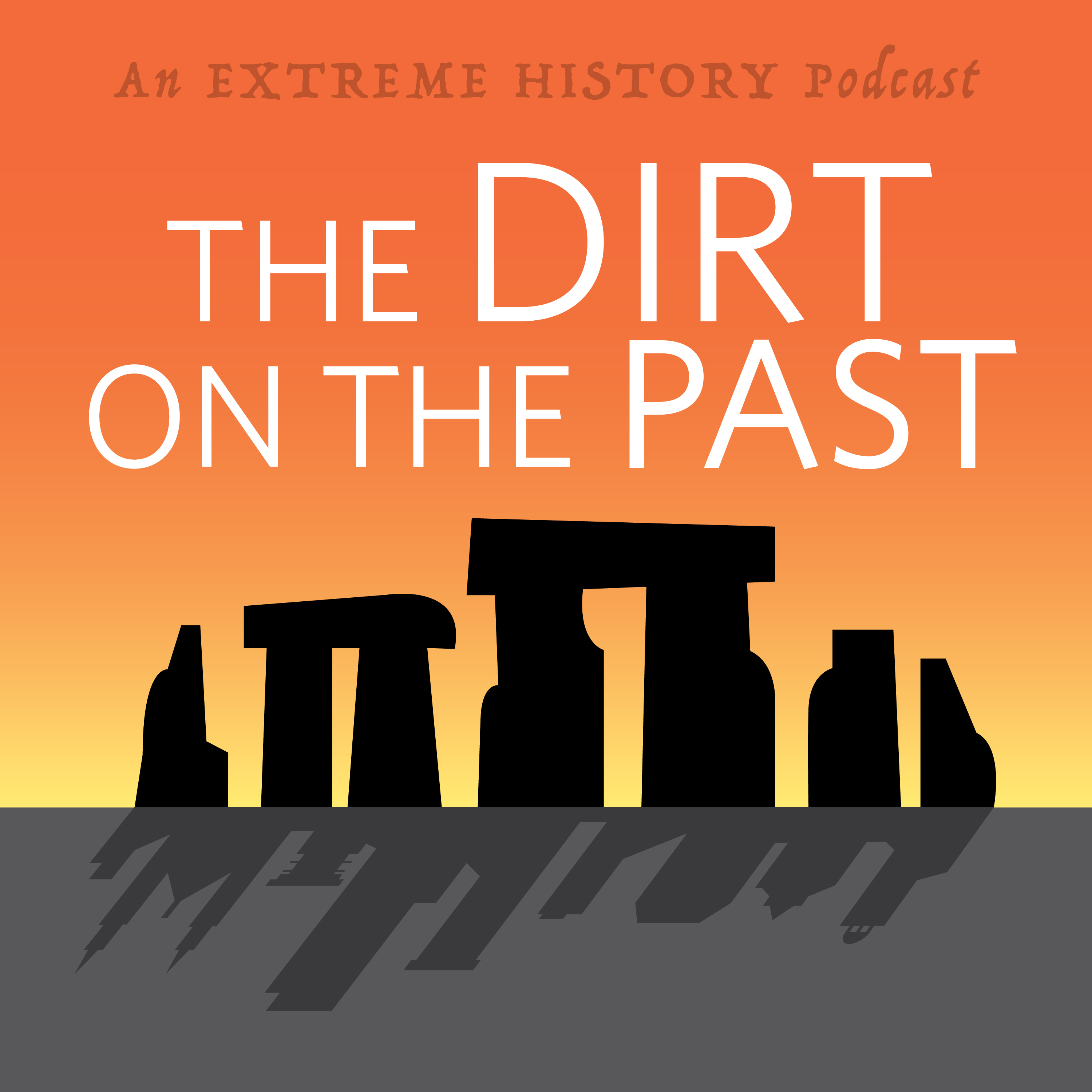
The Extreme History Project: The Dirt on the PastStolen Spirits with Chip ColwellWho owns the past and the objects that connect us to history? We discuss this and so much more with Chip Colwell as we talk about his book, Plundered Skulls and Stolen Spirits: Inside the Fight to Reclaim Native America's Culture. Our conversation revolves around NAPRA, repatriation of human remains, and ultimately human dignity and the importance of relationships. Chip Colwell is the founding Editor-in-Chief of SAPIENS, an online magazine about anthropological thinking and serves as co-host of the SAPIENS podcast. He served as the Senior Curator of Anthropology at the Denver Museum of Nature & Science for 12 years and has...
2022-01-221h 13
SAPIENS: A Podcast for Everything HumanGuided by the PastHosts Dr. Ora Marek-Martinez and Yoli Ngandali share how they found their way to archaeology and what it means to be Black and Indigenous archaeologists. From defying the status quo in a classroom to diving through sunken ships, Ora and Yoli bring listeners on a journey of reclaiming stories and reimagining history.
(00:00:10) How hosts Dr. Ora Merek-Martinez and Yoli Ngandali met.
(00:03:27) Why Indigenous archaeology is not the same as non-Indigenous archaeology.
(00:09:11) What is Maritime archaeology?
(00:12:18) Important vocabulary for Season 4.
(00:18:10) What is the future of archaeology?
(00:19:38) Credits.
SAPIENS: A Podcast for Everything Human, is pr...
2022-01-1921 min
SAPIENS: A Podcast for Everything HumanOur Past is the FutureWe're launching a new season, asking what makes you … you? And who tells which stories and why? SAPIENS hosts Ora Marek-Martinez and Yoli Ngandali explore stories of Black and Indigenous scholars as they transform the field of archeology and the stories that make us … us.
(00:00:02) Meet Dr. Ora Marek-Martinez and Yoli Ngandali.
(00:00:51) How season four came to be.
(00:01:53) Season four previews.
SAPIENS: A Podcast for Everything Human, is produced by House of Pod and supported by the Wenner-Gren Foundation. SAPIENS is also part of the American Anthropological Association Podcast Library. This season was create...
2022-01-1203 min
Walkabout the GalaxyPerpendicular Planets and a Chip Off the Old MoonWe explore an exoplanet system where the orbits of the planets are at right angles to each other. A chunk of rock trailing the Earth around the Sun may be a chunk of the Moon, and we take a look at some of the more interesting ways of getting into space and traveling long distances once we're there.
2021-11-1748 min
时差 in-betweenness#12 宗教學:信仰,魔法,身份,權力 | Religious Studies: Marxist Feminism, Chaplaincy, Medicine, Magic, &Power「宗教」並不外在於日常生活,而是彌散在社會、歷史、文化、政治中的點滴;「宗教學」幫助我們反思歷史,同時理解今天的世界。嘉賓:賓夕法尼亞大學 程曉文 (Hsiao-wen Cheng)香港大學 李紀弗吉尼亞理工大學 倪湛舸芝加哥大學神學院神務碩士 醫院宗教師 鄭利昕 (zhenglixin0@gmail.com)主持:郭婷 2:47 悼念林富士老師(1960-2021)4:50 英美神學院、宗教學經歷41:32 落後與進步的形成、護家盟、福音派的全球聯繫45:40 美國宗教師(chaplain)的訓練56:10 宗教系在美國與去基督教化1:03:17 「宗教」彌散在社會、歷史、文化、政治(diffused religion)1:07:47 宗教是具身的實踐(embodied practices)1:08:21 基督新教對今天宗教概念的壟斷影響,但基督教本身也是不斷發展和變化的歷史過程1:14:11 信仰與能動性(agency)1:19:09 信仰作為看待個體、群體、歷史、當代的媒介;《米納里》裡的移民、韓戰與宗教;《茲山魚譜》裡的儒家與天主教;傳統與文化的不斷流變,不同人群的彼此影響與塑造;情感作為宗教1:40:35 保障少數群體的主體性話語權1:40:47 制度性的結構不平等下的性別與種族,天主教的守貞女1:44:32 是宗教/文化的問題,還是權力的問題1:46:25 神務工作,勞動的性別分工1:51:03 方術,網絡文化,性別1:59:58 宗教與意識形態,公民社會2:05:50 norm/「正常」「規範」的歷史2:15:07 法國神水2:19:48 女巫,地方知識,獵巫2:21:40 江紹原,迷信研究與《新青年》,邵氏電影參考書目Lila Abu-Lughod, Do Muslim Women Need Saving? Saba Mahmood, Religious Difference in a Secular Age: A Minority Report BookDavid Palmer & Vincent Goossaert, The Religious Question in Modern ChinaDavid Palmer, Martin Tse, Chip Colwell. 'Guanyin's Limbo: Icons as Demi-Persons & Dividuating Objects.' American Anthropologist 121.4(2019):897-910.Henrietta Harrison, The Missionary’s Curse and Other Tales from a Chinese Catholic Village. (UC2013); 沈艾娣著, 郭偉全譯, 《傳教士的詛咒 :一個華北村莊的全球史(1640–2000)》港中大, 2021David Ownby, Vincent Goossaert, Ji Zhe eds., Making Saints in Modern China (OUP, 2017)Ji Li, God’s Little Daughters: Catholic Women in Nineteenth-Century Manchuria (UW, 2015)Nirmala S. Salgado, Buddhist Nuns and Gendered Practice: In Search of the Female Renunciant (OUP, 2013)James A. Schultz, “Heterosexuality as a Threat to Medieval Studies,” Journal of the History of Sexuality 15.1 (2006):14–29Terry Gross’s interview with Laurel Thatcher Ulrich, “How Mormon Polygamy in the 19th Century Fueled Women’s Activism” (January 17, 2017)Hsiao-wen Cheng, Divine, Demonic...
2021-06-262h 35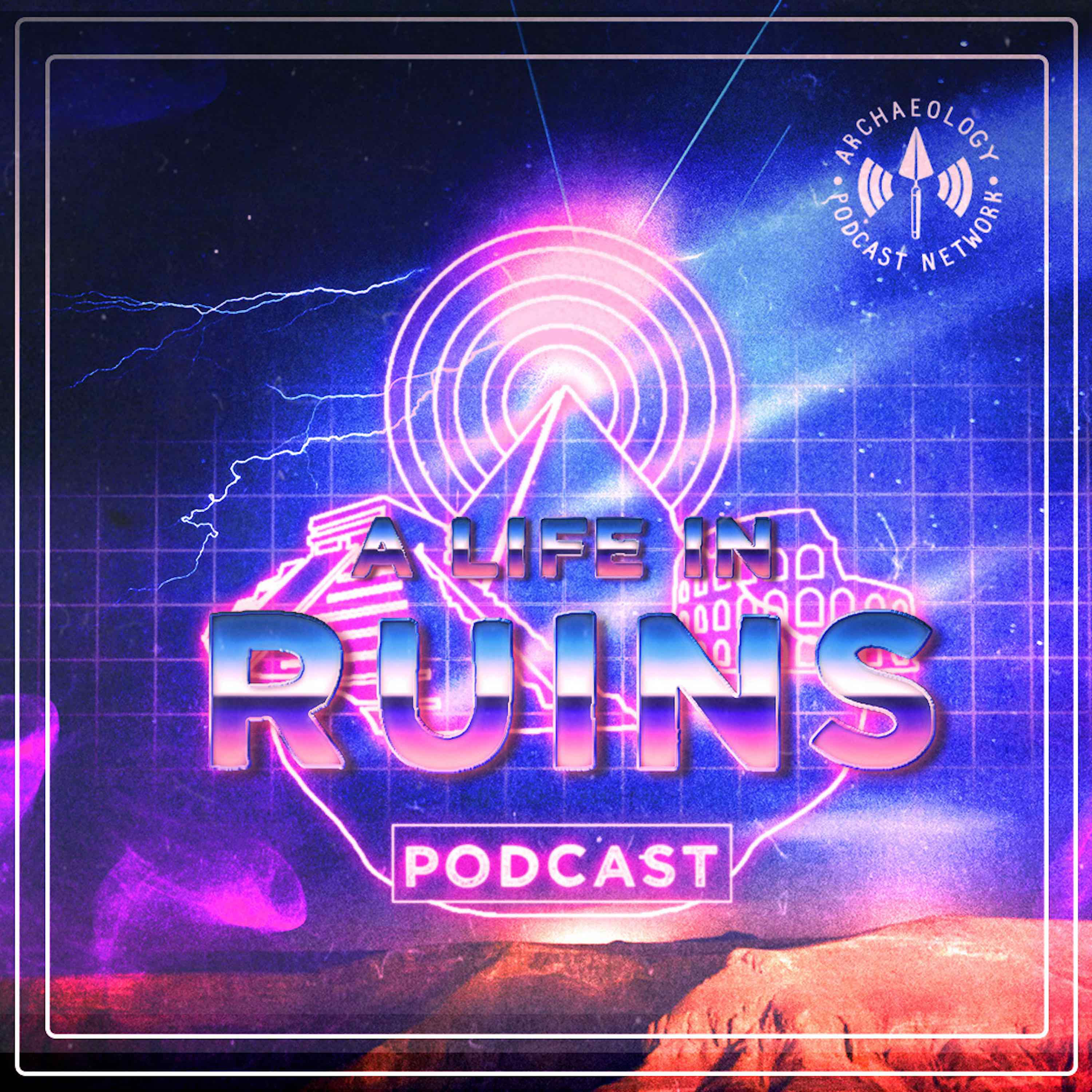
A Life In RuinsSAA 86th Annual Conference: An Indigenous Response
In this special edition of the A Life in Ruins Podcast, Carlton co-hosts an episode with Emily Van Alst, Ash Boydston-Schmidt, and Kay Mattena. The four discuss the recent SAA controversy surrounding the "Curation, Repatriation, and Accessibility: Vital Ethical Conversations" session. Specifically, the “Has Creationism Crept Back into Archaeology?” presentation.The four Indigenous scholars discuss their thoughts, feelings, and reactions to the content of the presentation, their disappointment in the SAA for platforming the talk, the future of the SAA, and how the society can improve its ethics and better support its Indigenous scholars.Lastly, they...
2021-05-021h 09
Zora's DaughtersS1, E15 B**** Better Have My MoneyMo' money, fewer problems? Today, Brendane & Alyssa take on the question of getting that government guap - reparations, baby! Our new sound is finally here - shout out to our music producer Segnon Tiewul for di big tuuuune! Let us know what you think on Twitter and Instagram. Additionally, the Graduate Workers at Columbia University are currently on strike to push agreement on a fair labor contract with the university, who has threated to dock pay. Donate to the solidarity fund here. *Note* The conference panel Alyssa talks about moderating was postponed due to the strike.
An...
2021-03-311h 33
SAPIENS: A Podcast for Everything HumanA Startling Link Between Neanderthals and COVID-19SAPIENS host Chip Colwell speaks with evolutionary geneticist Hugo Zeberg about his surprising discovery of a connection between Neanderthal DNA and a greater risk for severe COVID-19. Zeberg is also a researcher at the Karolinska Institutet in Sweden and the Max Planck Institute for Evolutionary Anthropology in Germany.Read the paper in Nature Zeberg co-authored announcing the discovery: “The Major Genetic Risk Factor for Severe COVID-19 Is Inherited From Neanderthals.”
2020-12-0821 min
SAPIENS: A Podcast for Everything HumanMoments of Resilience Amid a PandemicSAPIENS host Chip Colwell speaks with Melanie Adams, the director of the Smithsonian’s Anacostia Community Museum (ACM), about #Moments of Resilience, the ACM’s effort to document and eventually tell African Americans’ stories about the times we're living through now. They also discuss the unique role of a community museum, the value of oral history, and the communities the ACM serves from its home in Washington, D.C.
Check out these links to the three stories Melanie reads in this episode:
Spreading Joy; One Rock at a Time
More Than a Cup of Coffee
The Resurre...
2020-11-2426 min
SAPIENS: A Podcast for Everything HumanIs the Pandemic Slowing Down Love?SAPIENS host Jen Shannon speaks with biological anthropologist Helen Fisher about her research on love, sex, and everything in between. Fisher is the author of six books, the chief scientific adviser for the online dating site Match.com, and a leading researcher on dating trends in America. In this episode, Fisher shares insights from a recent survey.
The New York Times piece Fisher references in this episode is available here: “How Coronavirus Is Changing the Dating Game for the Better.”
2020-11-1226 min
SAPIENS: A Podcast for Everything HumanWhen at Home, Bake as the Romans BakedSAPIENS host Chip Colwell talks with experimental archaeologist Farrell Monaco about her work re-creating ancient Roman bread and what it means to reconnect with bakers of the past. Farrell also offers some tips for pandemic-era bakers who want to take their new hobby to the next level.
For more from Farrell, her award-winning website is Tavola Mediterranea.
Read more about experimental archaeology, including Farrell and her work, at SAPIENS.org: “Pandemic Bakers Bring the Past to Life.” And go ahead and try to make the Roman bread recipe described by Cato the Elder.
2020-10-2726 min
SAPIENS: A Podcast for Everything HumanA Vaccine Will Not Be EnoughSAPIENS host Jen Shannon speaks with Agustín Fuentes, a professor of anthropology at Princeton University, to unpack his insight that the COVID-19 pandemic is a biosocial phenomenon. They also discuss his recent suggestion that the virus “is not the only hazard to human health and well-being” right now.
Recently elected to the American Academy of Arts and Sciences, Fuentes is a decorated anthropologist and an author of many books. His latest is Why We Believe: Evolution and the Human Way of Being.
For more from Fuentes, an excerpt of Why We Believe is available at SAPIENS.or...
2020-10-1424 min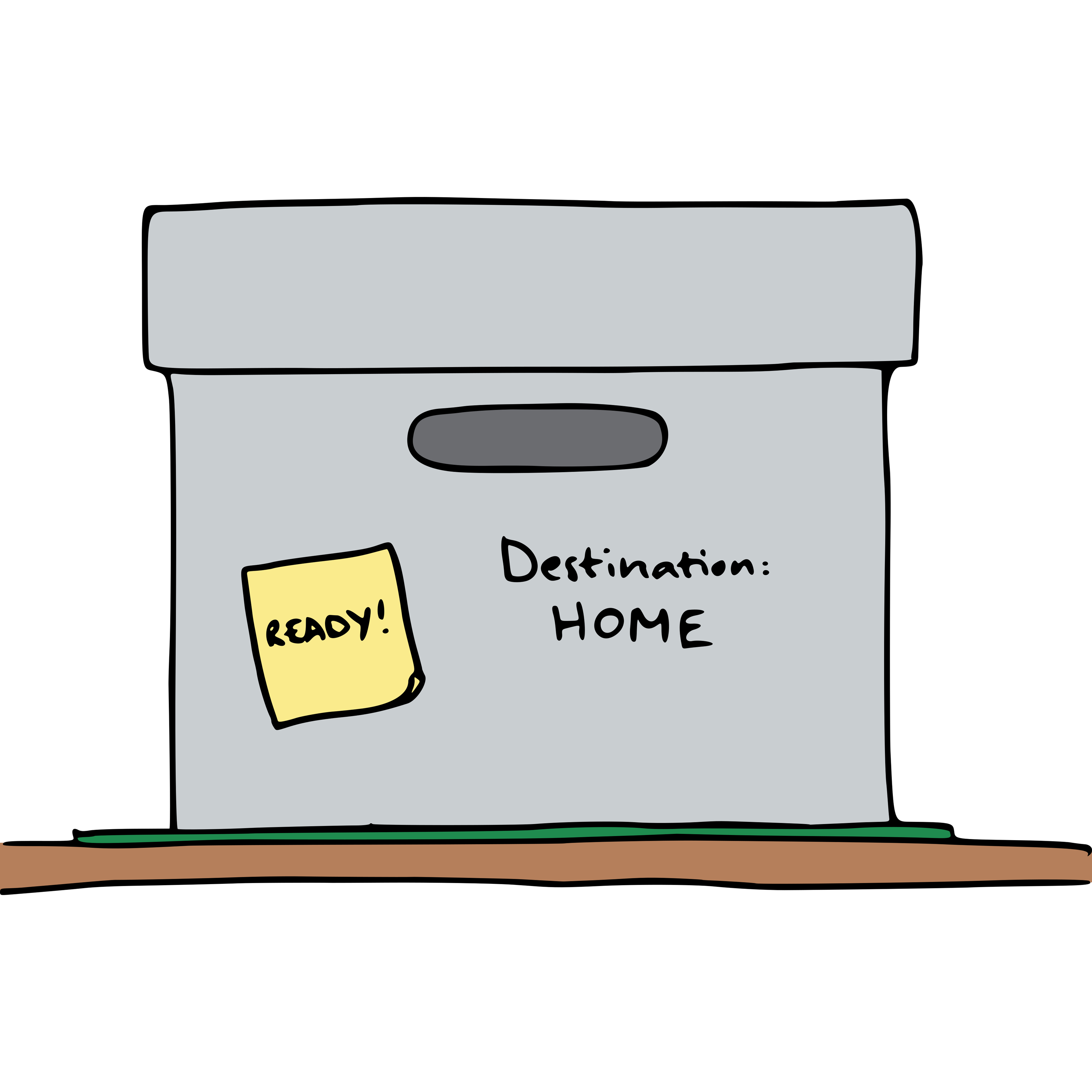
The C Word (MP3 Feed)S08E03: Returning Cultural ObjectsWe’re joined by special guest hosts Jeremy Uden and Marina de Alarcón from the Pitt Rivers Museum as we discuss the return of cultural objects. What are some of the attitudes we’ve encountered, and what is the role of the conservator in this? Kloe talks to Mark Furness about preparing objects for return, and Daniel Schwartz about how we can become better facilitators. Also tune in for a review of ’Plundered Skulls and Stolen Spirits’ by Chip Colwell.
00:00:52 Repatriation or restitution?
00:03:01 Attitudes in the sector
00:10:47 Where did we get these things to begin wit...
2020-10-141h 14
The C Word (M4A Feed)S08E03: Returning Cultural ObjectsWe’re joined by special guest hosts Jeremy Uden and Marina de Alarcón from the Pitt Rivers Museum as we discuss the return of cultural objects. What are some of the attitudes we’ve encountered, and what is the role of the conservator in this? Kloe talks to Mark Furness about preparing objects for return, and Daniel Schwartz about how we can become better facilitators. Also tune in for a review of ’Plundered Skulls and Stolen Spirits’ by Chip Colwell.
00:00:52 Repatriation or restitution?
00:03:01 Attitudes in the sector
00:10:47 Where did we get these things to begin wit...
2020-10-141h 14
SAPIENS: A Podcast for Everything HumanWe're (Still) Going ViralThe SAPIENS podcast will return in several months, and we want you to help us understand what it means to be human amid the COVID-19 pandemic. Do you have a question, thought, or idea about what it means to be human right now? Tweet at us @SAPIENS_org, message us on Facebook, or leave us a voicemail at 1-970-368-9730.
2020-08-2802 min
SAPIENS: A Podcast for Everything HumanThe Problem With Abstract ThreatsEveryone seems to have a story about the moment when the novel coronavirus pandemic stopped being an abstract problem “somewhere out there” and started being a very real and personal threat. In this episode of the SAPIENS podcast, hosts Jen Shannon and Chip Colwell interrogate the problem with abstract threats with the help of anthropologists Hugh Gusterson and Kristin Hedges. In closing, Steve Nash returns to discuss a different abstract concept: time.
Hugh Gusterson is a professor of anthropology and international affairs at George Washington University. Follow him on Twitter @GustersonP and read his recent piece at SAPIENS maga...
2020-07-0234 min
SAPIENS: A Podcast for Everything HumanWhat Pandemics Leave BehindAt some time in the future, the novel coronavirus pandemic will fade. What will this globally traumatic contagion leave in its wake? In this episode of the SAPIENS podcast, hosts Jen Shannon and Chip Colwell keep an eye on the future while looking to the past for answers: In the 14th century, the Black Death killed as much as one-third of the population of Europe, but it also sparked new ideas that linger to this day, including one of our favorite modern myths.
In closing, Steve Nash returns to discuss the plague doctors of Venice and the m...
2020-06-1834 min
SAPIENS: A Podcast for Everything HumanPolice Violence and the PandemicSAPIENS host Jen Shannon interviews Laurence Ralph, a professor of anthropology at Princeton University. Ralph is also a co-director of Princeton’s Center on Transnational Policing, the editor of Current Anthropology, and the author of the new book The Torture Letters: Reckoning With Police Violence, which exposes the Chicago Police Department’s history of torturing black men and women, and documents the community activism intent on stopping such violence.
The poll Jen mentions in this episode was conducted by Monmouth and published on June 2, 2020.
2020-06-1224 min
SAPIENS: A Podcast for Everything HumanCould the Coronavirus Pandemic Be Good for the Environment?SAPIENS host Chip Colwell interviews Elic Weitzel, a doctoral candidate in anthropology at the University of Connecticut, about his recent article for SAPIENS that considers how the global pandemic may impact climate change—for better or for worse. Weitzel is currently working on his dissertation on the environmental effects of the Black Death on 14th-century Eurasia and the depopulation of Native Americans in the wake of European colonization. Read his SAPIENS article: “Are Pandemics Good for the Environment?”
2020-05-2916 min
SAPIENS: A Podcast for Everything HumanPreppers and the PandemicWith the arrival of the coronavirus pandemic, the SAPIENS podcast is going viral. In this first episode of season 3, SAPIENS hosts Chip Colwell and Jen Shannon revisit a story about preppers from our first season. Jen calls Chad Huddleston, one of the anthropologists featured on that show, to find out how he and the preppers he studies are handling the COVID-19 crisis. In closing, Chip reaches out to SAPIENS columnist and anthropologist Steve Nash to discuss panic buying, toilet paper, and more.
Chad Huddleston is an adjunct assistant professor at St. Louis University and an instructor at Southern Ill...
2020-05-1928 min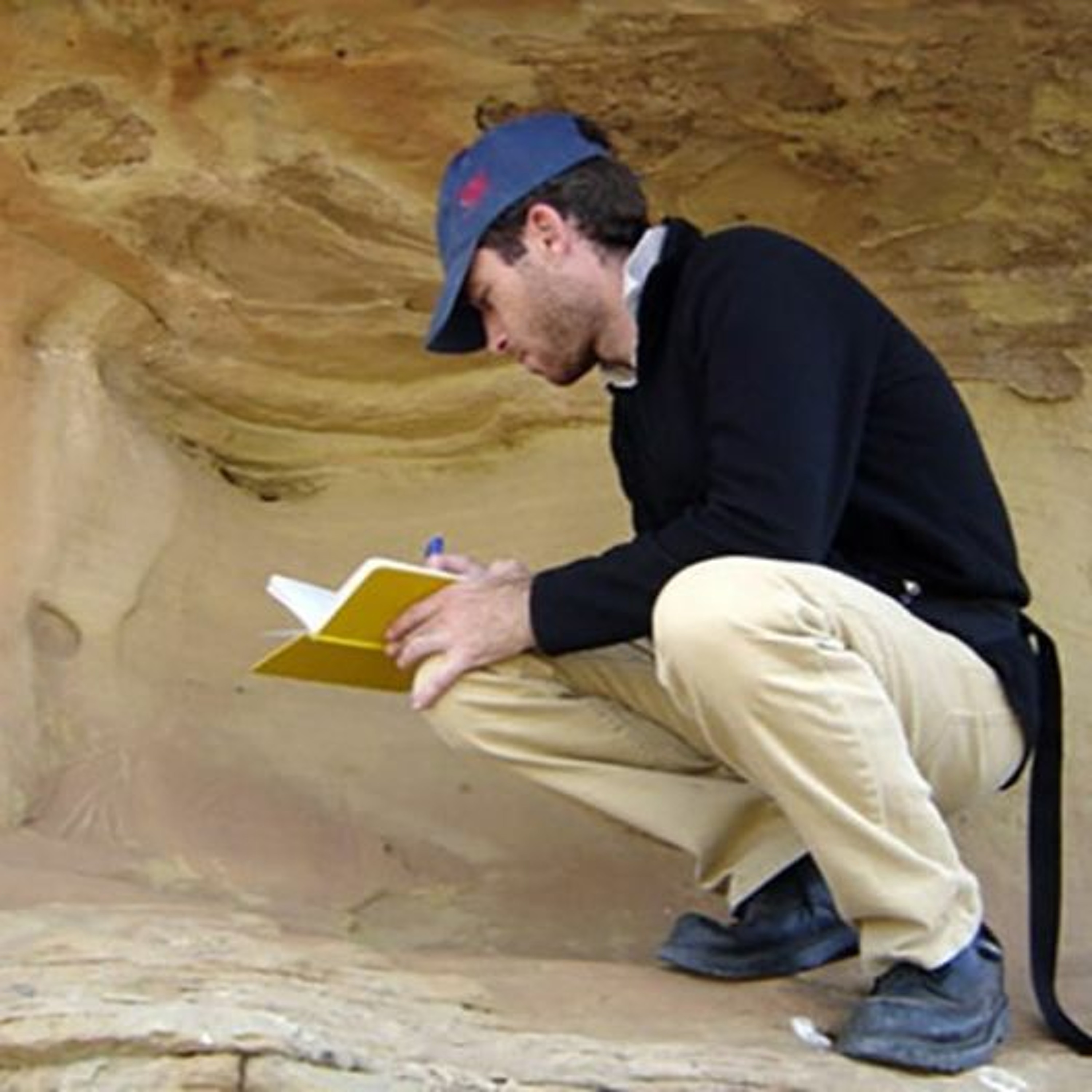
RadioCIAMSRadioCIAMS with Chip ColwellOn February 28, 2020, Dr. Chip Colwell of the Denver Museum of Nature and Science met with a panel of CIAMS students and faculty to discuss his most recent book, Objects of Survivance: A Material History of the American Indian School Experience, co-authored with Lindsay M. Montgomery.
2020-03-0947 min
SAPIENS: A Podcast for Everything HumanWhat Does it Mean to be Human? Your Questions, AnsweredIn this season 2 finale of the SAPIENS podcast, hosts Jen Shannon, Chip Colwell, and Esteban Gómez field questions from listeners on Twitter and at the Denver Museum of Nature & Science about what it means to be human. They address human origins and self-awareness, discrimination, social media, and more!
You can follow all of our expert guests on Twitter: Augustin Fuentes at the University of Notre Dame (@Anthrofuentes); Daniel Miller at the University College London (@DannyAnth); and Barbara King, professor emerita at William and Mary (@bjkingape).
Mark Shriver, professor at Pennsylvania State University, did a s...
2019-12-0325 min
SAPIENS: A Podcast for Everything HumanDoes Generosity Come Naturally?Until very recently, Colin Turnbull was the only anthropologist who had lived and studied with both the Mbuti people of the Congo region and the Ik of Uganda. Because of his writings, one community became known for its egalitarianism and the other for its selfishness. His observations of the Ik in particular, as “inhuman” and “inhospitable,” led to them being dubbed as “the loveless people.” Then in 2009, Cathryn Townsend earned the chance to live with the Ik to study to generosity. In this episode, she shares her insights on what she found, and what Turnbull may have gotten wrong.
To lea...
2019-11-1933 min
SAPIENS: A Podcast for Everything HumanHow Belonging Shapes the Vaccination CrisisAnthropologist Elisa Sobo never wanted to study the issue of vaccination. The topic was too fraught, she says, and she didn't want to touch it. But then she initiated a children’s health study at a school in California. Today her work on vaccine hesitancy offers insights into how those on opposing sides might better understand each other and work through this highly controversial issue.
For more, check out Elisa Sobo’s SAPIENS piece about her work on vaccination: “Beyond the Vaccination Rift.”
For the other vaccination-related SAPIENS article Chip mentions in this episode, see: “Why Eradic...
2019-11-0525 min
SAPIENS: A Podcast for Everything HumanThe Deep Roots of Navajo Country MusicWhat is it about certain musical traditions that cause them to take root in communities far away from where they originated? Anthropologist Kristina Jacobsen leads SAPIENS hosts Jen Shannon and Chip Colwell on a musical journey into the U.S. Southwest to understand the phenomenon that is Navajo country music. In addition to authoring the book The Sound of Navajo Country: Music, Language, and Diné Belonging, Jacobsen is a singer-songwriter. This episode includes one of her songs and a number of others she learned about during her time on the Navajo Nation.
Listen to more music by D...
2019-10-2234 min
SAPIENS: A Podcast for Everything HumanAre Colors Universal?How do language, biology, and culture shape an individual’s experience of color? A journalist investigates the anthropological debate about whether color is a human universal.
Remember the meme #TheDress? Was it white and gold, or blue and black? With the help of Nicola Jones, a freelance science journalist who writes for Nature and SAPIENS, SAPIENS host Jen Shannon explores the question of color perception to find answers. She learns about the book The World Color Survey, an Amazonian tribe in Peru whose language has no color words, the biology of the human eye.
Nicola Jone...
2019-10-0830 min
SAPIENS: A Podcast for Everything HumanStringing Together an Ancient Empire’s StoriesAnthropologist Sabine Hyland attempts to uncover the secrets held in twisted and colored Andean cords called khipus. Thanks to the collaborative approach of anthropologist Sabine Hyland and local communities, outsiders are finally coming to understand what these khipus mean—for the people of the Andes and for the rest of us.
Sabine Hyland is a professor of anthropology at the University of St. Andrews. Follow her on Twitter @Coyagirl.
For more on khipus, read Hyland’s article about the Collata khipus at SAPIENS.org: “Unraveling an Ancient Code Written in Strings.” The book Chip mentions at the en...
2019-09-2433 min
SAPIENS: A Podcast for Everything HumanDo You Dream What I Dream?Anthropologist Roger Lohmann sees a ghost in a dream while working in Papua New Guinea. Even though he knows it's just a dream, he's scared long after he wakes up. To make sense of his dream, Lohmann explores the role dreams play in our waking life and how different cultures make sense of dream worlds. Do all humans dream the same? Or do the cultures we are immersed in shape our dreams? Lohmann has six cultural dream theories that offer some answers to what dreams are and what they mean.
Roger Lohmann has six cultural dream theories...
2019-09-1023 min
SAPIENS: A Podcast for Everything HumanWhat to Expect When You’re Not Expecting Down SyndromeWhen Thomas Pearson’s newborn daughter was diagnosed with Down syndrome, it changed the course of his life forever. Pearson joins SAPIENS hosts Jen Shannon and Chip Colwell to talk about his story, how his training in anthropology prepared him for his daughter’s diagnosis, and what he hopes other people can learn from his experience. Pearson is a professor of cultural anthropology at the University of Wisconsin, Stout.
Read more about Pearson’s story and his research into disability studies on SAPIENS: “A Daughter’s Disability and a Father’s Awakening.”
The book Chip recommends at...
2019-08-2725 min
SAPIENS: A Podcast for Everything HumanWhere Have All the Denisovans Gone?The Denisovans have long been one of the most elusive ancient human cousins, until now. In May 2019, scientists revealed the first fossil evidence of Denisovans outside of the Denisova Cave in Siberia. As the historical human family tree grows, what are we learning about why we're the only ones left? In this episode, we pose this question to science journalist Carl Zimmer, a columnist for The New York Times and the author of 13 books. Follow him on Twitter @carlzimmer.
We also speak with archaeologist Anna Goldfield about Neanderthals, another close ancient cousin. Goldfield is a columnist at S...
2019-08-1327 min
SAPIENS: A Podcast for Everything HumanEating Insects and the Yuck FactorHow come some people think eating insects is disgusting? Join SAPIENS hosts Jen Shannon and Chip Colwell as they dine on many-legged delicacies and delve into the world of entomophagy with anthropologist Julie Lesnik, author of the new book Edible Insects and Human Evolution.
Julie is a professor of anthropology at Wayne State University. She tweets @JulieLesnik and her website is at www.entomoanthro.org. Learn more about eating insects at Sapiens.org: [Why Don’t More Humans Eat Bugs?](%20https:/www.sapiens.org/culture/eat-bugs/) SAPIENS: A Podcast for Everything Human is part of the American Ant...
2019-07-3026 min
SAPIENS: A Podcast for Everything HumanSeason 2 is Coming Soon and We Want to Hear from YouHello fellow sapiens!
We’re coming back with new episodes starting on July 30. This season is just a little different, though. SAPIENS hosts Jen Shannon and Chip Colwell are still asking big questions about what it means to be human, but this time they’re jumping off from some of the best stories from Sapiens.org, and culminating in questions... from you!
If you have a query about what it means to be human, we want to hear it!
Send your questions to us on Facebook at Sapiens.org, tweet them at us @sapi...
2019-07-1604 min
Journey To Be MeEpisode 11: Lynn chats with author and entrepreneur Ephriam ColwellEpisode 11: For this segment of the Journey To Be Me podcast I am chatting with author and entrepreneur Ephriam Colwell of Myopress. We discuss his book "Chip N Nails" as well as his neuromuscular therapy business--Myopress. There are some real gems here people about taking risks and doing what is in your heart to do. If you'd like to find out more about Myopress visit (http://www.myopress.com/) and if you'd like to order your own copy of "Chip N Nails" visit (https://www.amazon.com/)!
2019-05-0412 min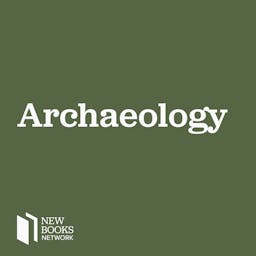
New Books in ArchaeologyChip Colwell, "Plundered Skulls and Stolen Spirits: Inside the Fight to Reclaim Native America's Culture" (U Chicago Press, 2017)Five decades ago, Native American leaders launched a crusade to force museums to return their sacred objects and allow them to rebury their kin. Today, hundreds of tribes use the Native American Graves Protection and Repatriation Act to help them recover their looted heritage from museums across the country. As senior curator of anthropology at the Denver Museum of Nature & Science, Chip Colwell has navigated firsthand the questions of how to weigh the religious freedom of Native Americans against the academic freedom of scientists and whether the emptying of museum shelves elevates human rights or destroys a common heritage...
2019-04-191h 06
New Books in Indigenous StudiesChip Colwell, "Plundered Skulls and Stolen Spirits: Inside the Fight to Reclaim Native America's Culture" (U Chicago Press, 2017)Five decades ago, Native American leaders launched a crusade to force museums to return their sacred objects and allow them to rebury their kin. Today, hundreds of tribes use the Native American Graves Protection and Repatriation Act to help them recover their looted heritage from museums across the country. As senior curator of anthropology at the Denver Museum of Nature & Science, Chip Colwell has navigated firsthand the questions of how to weigh the religious freedom of Native Americans against the academic freedom of scientists and whether the emptying of museum shelves elevates human rights or destroys a common heritage...
2019-04-191h 06
New Books in ArtChip Colwell, "Plundered Skulls and Stolen Spirits: Inside the Fight to Reclaim Native America's Culture" (U Chicago Press, 2017)Five decades ago, Native American leaders launched a crusade to force museums to return their sacred objects and allow them to rebury their kin. Today, hundreds of tribes use the Native American Graves Protection and Repatriation Act to help them recover their looted heritage from museums across the country. As senior curator of anthropology at the Denver Museum of Nature & Science, Chip Colwell has navigated firsthand the questions of how to weigh the religious freedom of Native Americans against the academic freedom of scientists and whether the emptying of museum shelves elevates human rights or destroys a common heritage...
2019-04-191h 06
The University of Chicago Press PodcastChip Colwell, "Plundered Skulls and Stolen Spirits: Inside the Fight to Reclaim Native America's Culture" (U Chicago Press, 2017)Five decades ago, Native American leaders launched a crusade to force museums to return their sacred objects and allow them to rebury their kin. Today, hundreds of tribes use the Native American Graves Protection and Repatriation Act to help them recover their looted heritage from museums across the country. As senior curator of anthropology at the Denver Museum of Nature & Science, Chip Colwell has navigated firsthand the questions of how to weigh the religious freedom of Native Americans against the academic freedom of scientists and whether the emptying of museum shelves elevates human rights or destroys a common heritage...
2019-04-191h 06
New Books in Museum StudiesChip Colwell, "Plundered Skulls and Stolen Spirits: Inside the Fight to Reclaim Native America's Culture" (U Chicago Press, 2017)Five decades ago, Native American leaders launched a crusade to force museums to return their sacred objects and allow them to rebury their kin. Today, hundreds of tribes use the Native American Graves Protection and Repatriation Act to help them recover their looted heritage from museums across the country. As senior curator of anthropology at the Denver Museum of Nature & Science, Chip Colwell has navigated firsthand the questions of how to weigh the religious freedom of Native Americans against the academic freedom of scientists and whether the emptying of museum shelves elevates human rights or destroys a common heritage...
2019-04-191h 06
SAPIENS: A Podcast for Everything HumanBeing Afghan in America: In the Field with Morwari ZafarHow does an immigrant become an American? How does anyone join any group? SAPIENS host Esteban Gomez shares the story of Dr. Morwari Zafar, a researcher who has studied the changes in her own community of Afghan-Americans in Fremont, California, in the wake of 9-11. From the first major wave of immigration in the late 1980s and early 1990s, to 9-11 and the U.S. invasion of Afghanistan, the Afghan-American community has been in flux, exemplifying the mysteries of group identity, dynamics, and nationhood. Morwari recently completed a PhD in anthropology at Oxford University. Her PhD dissertation is available on...
2018-12-1832 min
SAPIENS: A Podcast for Everything HumanWhat’s the Cost of Quinoa?SAPIENS host Jen Shannon goes on a mission to find out how quinoa travels from farmers’ fields in Huanoquite, Peru, to markets in Lima and the U.S. She discovers quinoa’s complicated past and present: a bloody civil war that shook the nation, the chefs who tried to use food as a racial reconciliation project, and the current economic and social pressures small producers face when they take on huge risks to bring their product from field to market.
Linda Seligmann is a professor emeritus of sociocultural anthropology at George Mason University. She has worked in the...
2018-12-0431 min
SAPIENS: A Podcast for Everything HumanHow to Care for the DeadScientists have thought about burial—the act of interring a dead body—as a distinctly human behavior. So what happened when a group of paleoanthropologists discovered a primitive hominid that may have entombed its dead? And how do people respond when they are unable to find and care for the remains of their loved ones? SAPIENS host Jen Shannon talks to Mercedes Doretti, co-founder of the Argentine Forensic Anthropology Team, about the 38,000 people who have disappeared in Mexico since 2006. They discuss forensic scientists’ strategies in cases in which missing migrants cannot be found and others in which remains have not yet been id...
2018-11-2030 min
SAPIENS: A Podcast for Everything HumanBONUS: A Conversation with Carl Zimmer about DNA, Identity, and HereditySurprise!
As a special holiday treat, the SAPIENS team is presenting this unedited conversation between SAPIENS host Chip Colwell and acclaimed science journalist Carl Zimmer about DNA, identity, and heredity.
This conversation was previously excerpted in our episode “Is Your DNA You?” It took place in front of a live audience at the Denver Museum of Nature & Science on June 20, 2018.
Carl Zimmer’s new book is She Has Her Mother's Laugh: The Powers, Perversions, and Potential of Heredity. Learn more about Zimmer’s work at carlzimmer.com.
This episode of SAPIENS was prod...
2018-11-131h 18
SAPIENS: A Podcast for Everything HumanIs Space a Human Place?From space junk and the International Space Station to Elon Musk and SpaceX, space is becoming a more human place. What will it mean for us to live among the stars? SAPIENS host Jen Shannon probes the nascent field of space archaeology and looks to the mystery of exoplanets for answers.
Alice Gorman is a senior lecturer in the college of humanities at Flinders University, and Justin Walsh is associate professor and chair of the Art Department at Chapman University. Together, they lead the International Space Station Archaeology Project.
Lisa Messeri is assistant professor of anthropology at Yale U...
2018-11-0632 min
SAPIENS: A Podcast for Everything HumanPower Players: US Football and French RugbySome athletes seem larger than life. They are revered and imitated—and they seemingly hold a lot of power. But whether they feel empowered in their lives and choices off the field depends on a variety of complex factors. We explore the experiences of black college football players in the U.S. and Fijian rugby players who migrate to play on teams in France to learn more.
Tracie Canada is a graduate student in the anthropology department at the University of Virginia. In 2017, her research project Tackling the Everyday: Race, Family, and Nation in Big-Time College Football wa...
2018-10-2327 min
SAPIENS: A Podcast for Everything HumanClose to Home: In the Field With Amy StarecheskiWhat is home? Is it a physical space, a set of relationships, or a state of mind? SAPIENS host Esteban Gómez follows Amy Starecheski, a researcher who has studied how squatters went legit and secured homeownership in New York City, as she seeks to answer these questions and more. With Starecheski, Gómez moves through two of New York’s most fascinating neighborhoods—the Lower East Side in Manhattan and Mott Haven in the Bronx. They discuss how people have navigated massive restructuring and shifts in housing policy in the late 20th and early 21st centuries.
Amy Sta...
2018-10-0929 min
SAPIENS: A Podcast for Everything HumanThe Mastodon in the RoomHumans may have been in North America much earlier than previously thought. Here’s the evidence: chipped rocks, crushed mastodon bones, and reliable dates showing the remains are 130,000 years old. Is that enough to rewrite the history? SAPIENS co-hosts Chip Colwell and Jen Shannon talk to Steven and Kathleen Holen, archaeologists and co-authors of a controversial discovery. And they further evaluate the claims with the help of anthropologist Todd Braje.
Steven Holen and Kathleen Holen are co-directors of the Center for American Paleolithic Research. Steven’s publications include series on Great Plains Paleoindian Archaeology and Ice Age Huma...
2018-09-2530 min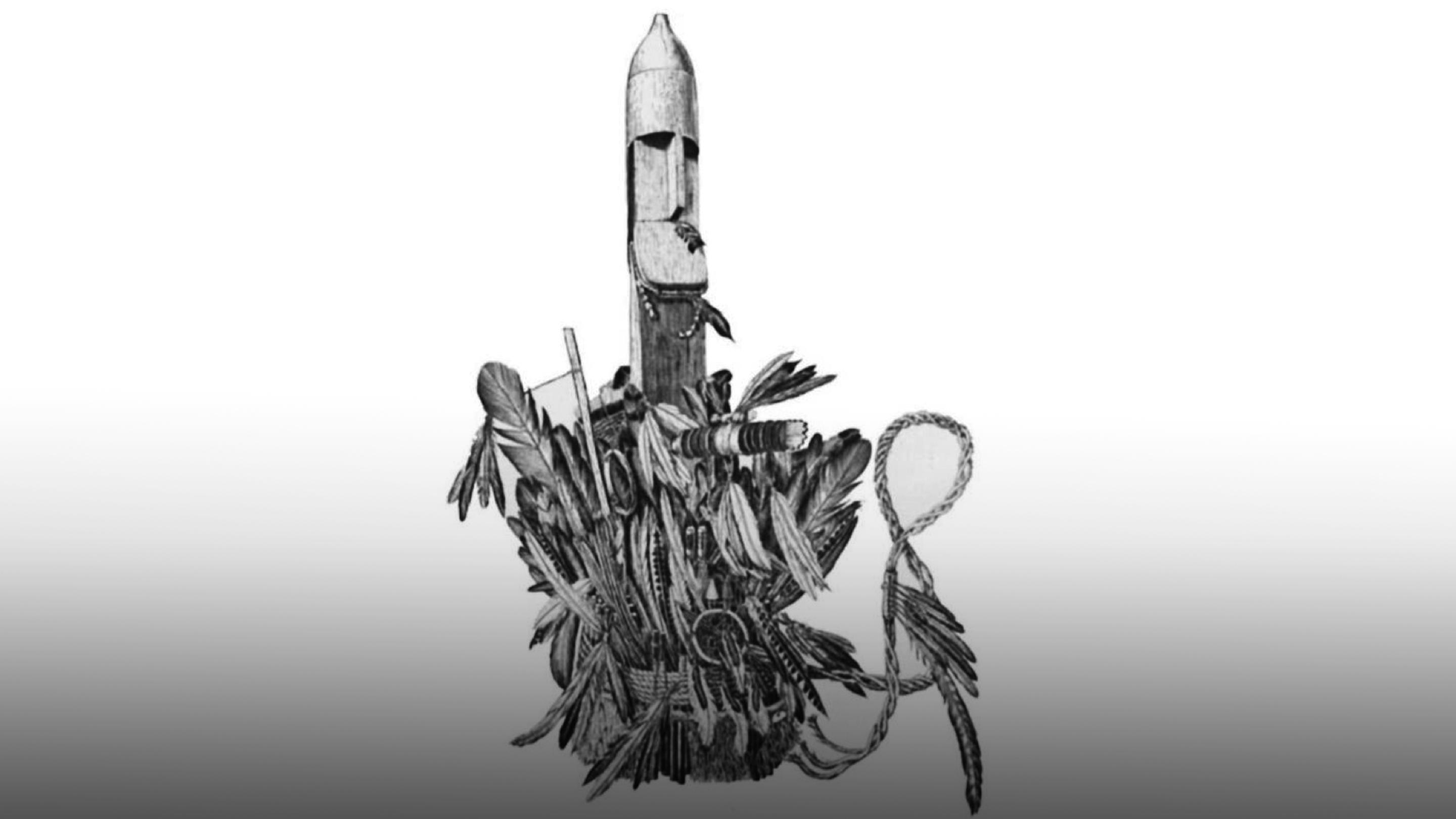
TED Talks Society and CultureWhy museums are returning cultural treasures | Chip ColwellArchaeologist and curator Chip Colwell collects artifacts for his museum, but he also returns them to where they came from. In a thought-provoking talk, he shares how some museums are confronting their legacies of stealing spiritual objects and pillaging ancient graves -- and how they're bridging divides with communities who are demanding the return of their cultural treasures.
2018-09-2013 min
TEDTalks Culture et sociétéPourquoi les musées restituent des trésors culturels | Chip ColwellChip Colwell, archéologue et conservateur, collectionne des artefacts pour son musée, mais il en retourne également sur leur lieu d'origine. Dans un discours qui pousse à la réflexion, il explique comment certains musées luttent contre l'héritage d'objets spirituels volés et de pillage de tombes anciennes - et comment ils rapprochent les communautés qui réclament la restitution de leurs trésors culturels.
2018-09-2013 min
TEDTalks 사회와 문화왜 박물관이 문화유산을 반환하고 있는가? | 칩 코웰(Chip Colwell)고고학자이자 큐레이터로 일하고 있는 칩 콜웰은 자신의 박물관을 위해 유물을 수집하고 있지만, 반대로 그 유물들을 원래 자리로 반환하기도 합니다. 시사하는 바가 많은 이 강연에서 그는 몇몇 박물관이 가지고 있는 소장품 중에서 빼앗아 가져온 영적인 유물들과 고대 무덤을 약탈해 얻은 유물들을 어떻게 처리해야 할지 이야기하고, 이러한 문화재의 반환을 요구하는 지역 사회들과 어떻게 격차를 좁히고 있는지 이야기합니다.
2018-09-2013 min
TEDTalks Sociedad y CulturaPor qué los museos están devolviendo los tesoros culturales | Chip ColwellEl arqueólogo y curador Chip Colwell colecciona objetos para su museo, pero también los devuelve a su lugar de origen. En una charla que invita a la reflexión, Colwell explica qué hacen algunos museos con el legado obtenido a partir de la sustracción de objetos de valor espiritual y del saqueo de tumbas antiguas. También nos cuenta cómo esos museos acercan posiciones con las comunidades que reclaman la restitución de sus tesoros culturales.
2018-09-2013 min
TEDTalks Sociedade e CulturaPor que os museus estão devolvendo tesouros culturais | Chip ColwellO arqueólogo e curador Chip Colwell coleta artefatos para o seu museu, mas também os devolve aos locais de onde vieram. Numa palestra esclarecedora, ele explica como alguns museus estão confrontando seu próprio passado de roubar objetos religiosos e de saquear túmulos antigos, e como estão se aproximando das comunidades que estão exigindo que seus tesouros culturais sejam devolvidos.
2018-09-2013 min
SAPIENS: A Podcast for Everything HumanPrepping for TEOTWAWKIIt’s the end of the world as we know it. How do you feel? SAPIENS co-host Jen Shannon follows the trail of some contemporary preppers with the help of anthropologist Chad Huddleston. Then she dives into history with Tim Kohler, an archaeologist and expert on Ancestral Puebloan peoples of the U.S. Southwest.
Chad Huddleston is an adjunct assistant professor of anthropology at Saint Louis University in Missouri and an instructor at Southern Illinois University, Edwardsville. In March, he published an article about his work with preppers at SAPIENS.org: “For Preppers, the Apocalypse Is Just Anot...
2018-09-1235 min
SAPIENS: A Podcast for Everything HumanIs Robot Empathy a Trap?Can robots care? And why should we care if they do? SAPIENS host Jen Shannon meets Pepper the robot, and host Chip Colwell goes on a quest to find out how the robotics industry is (re)shaping intimacy in Japan. He speaks with anthropologists Jennifer Robertson, Daniel White, and Hirofumi Katsuno, all researchers in the field of robotics, to learn more about what artificial emotion can teach us about what it means to be human.
Jennifer Robertson is a professor of anthropology and of the history of art at the University of Michigan, Ann Arbor.
Hi...
2018-08-2831 min
SAPIENS: A Podcast for Everything HumanIs Your DNA You?What does your DNA have to do with who you are? On a journey for answers, SAPIENS hosts Chip Colwell, Jen Shannon, and Esteban Gómez take consumer DNA tests and confront murky, interconnected issues of identity and heredity. Their guides include science journalist Carl Zimmer and anthropologists Deborah Bolnick and Kim TallBear.
Carl Zimmer has authored 13 books about science, including his latest work She Has Her Mother’s Laugh, which traces the history of heredity:
Deborah Bolnick is an incoming associate professor of anthropology at the University of Connecticut. Her research interests include anthropological geneti...
2018-08-1439 min
SAPIENS: A Podcast for Everything HumanA Trailer for Everything HumanWhat makes you … you? Is it your DNA, culture, environment? SAPIENS hosts Jen Shannon, Esteban Gómez, and SAPIENS.org Editor-in-Chief Chip Colwell speak with anthropologists from around the globe to help us uncover what makes us human. Subscribe now to learn more.
The SAPIENS podcast is supported by the Wenner-Gren Foundation and produced by House of Pod.
2018-08-0402 min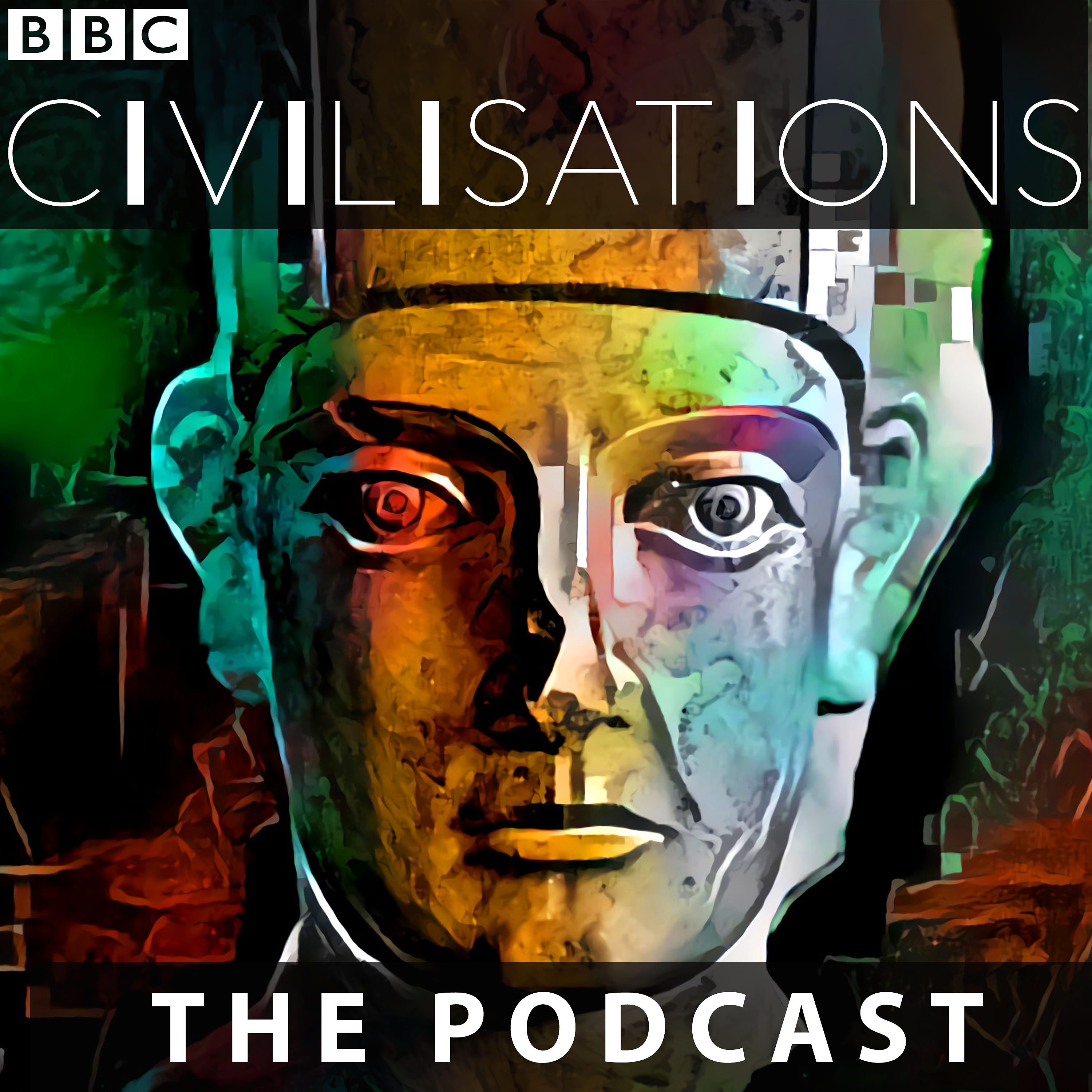
The Civilisations PodcastEpisode 8: Matika Wilbur, Chip Colwell and Ernest House Jr.In the 8th programme in the Civilisations TV series, David Olusoga looks at how artists reacted to the colonialism of the 19th century. He travels to America to see art by both white and Native American artists who were documenting the displacement and suffering of Native peoples. A common view at the time was that indigenous Americans would disappear completely. For the podcast, Viv Jones speaks to three people who are working to remind the world that Native Americans are not a people of the past. In spite of all that their communities have had to overcome...
2018-04-1933 min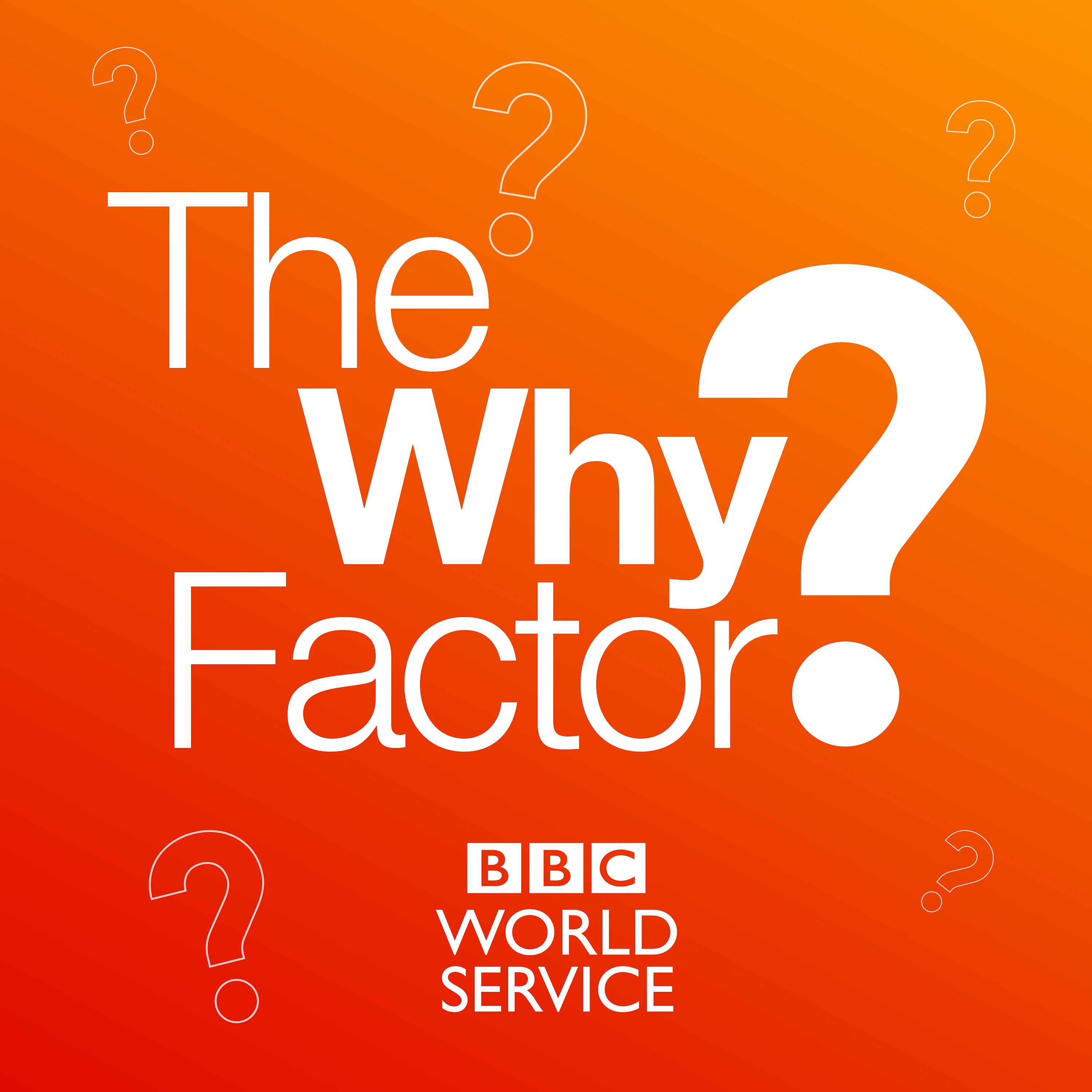
The Why FactorHuman Remains in MuseumsMany museums around the world hold human bodies and body parts. Egyptian mummies draw huge crowds curious about our ancient past and specimens in medical museums allow us to imagine our own bodies from the inside. Many of these museum objects have become highly contested. Whilst some people may look at them and see artefacts or tools for knowledge, for others, human remains remain human.
Shivaani Kohok explores why storing and displaying human remains in museums is so contentious. Many human remains in medical museums were obtained without the consent of the people they were removed from: curators like...
2017-08-2823 min